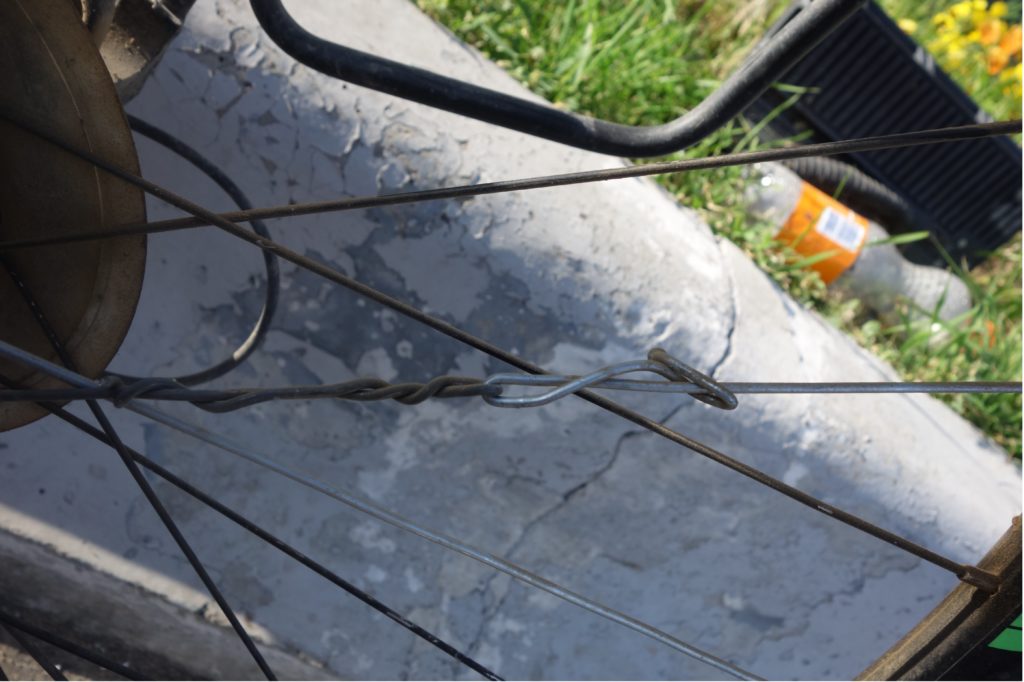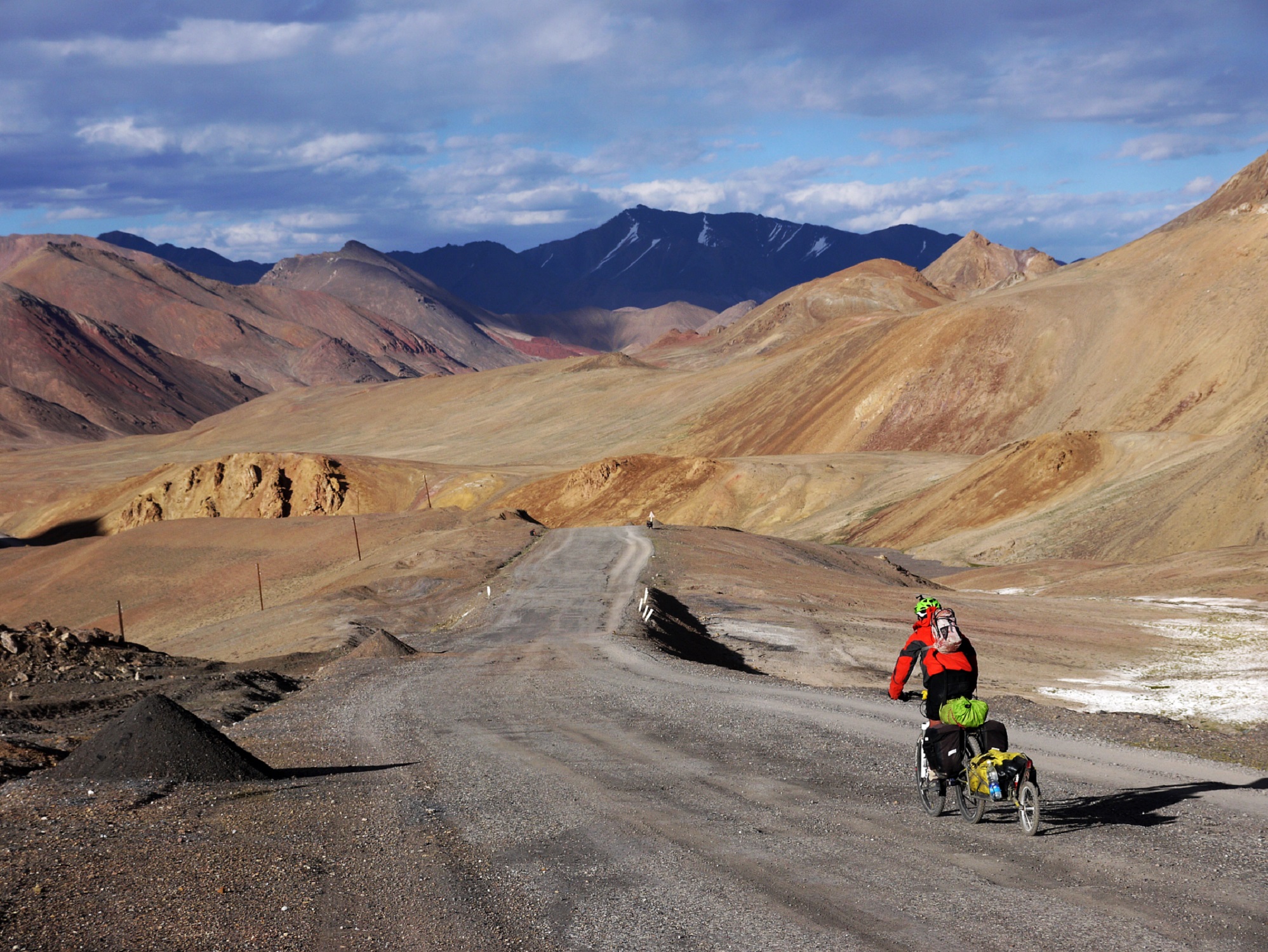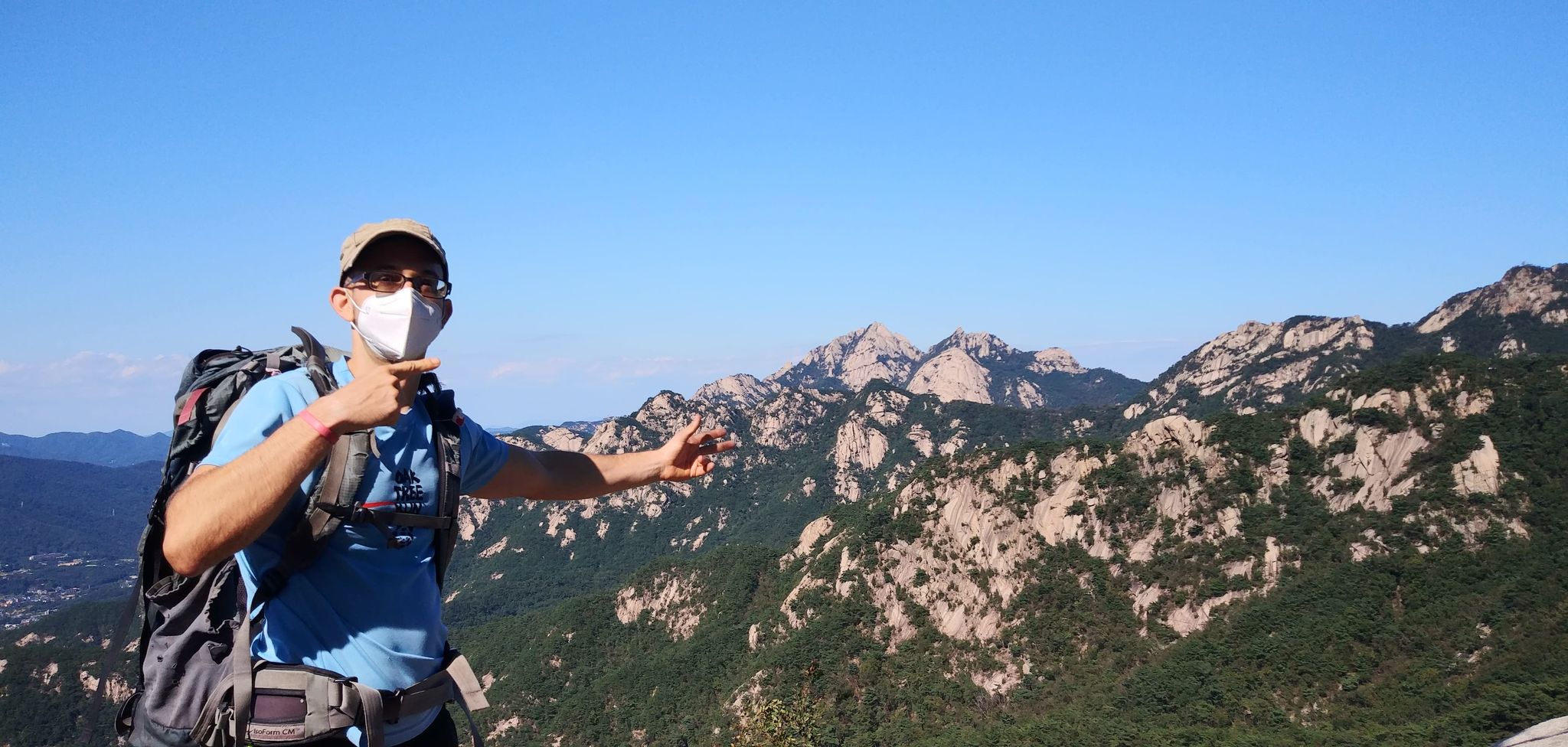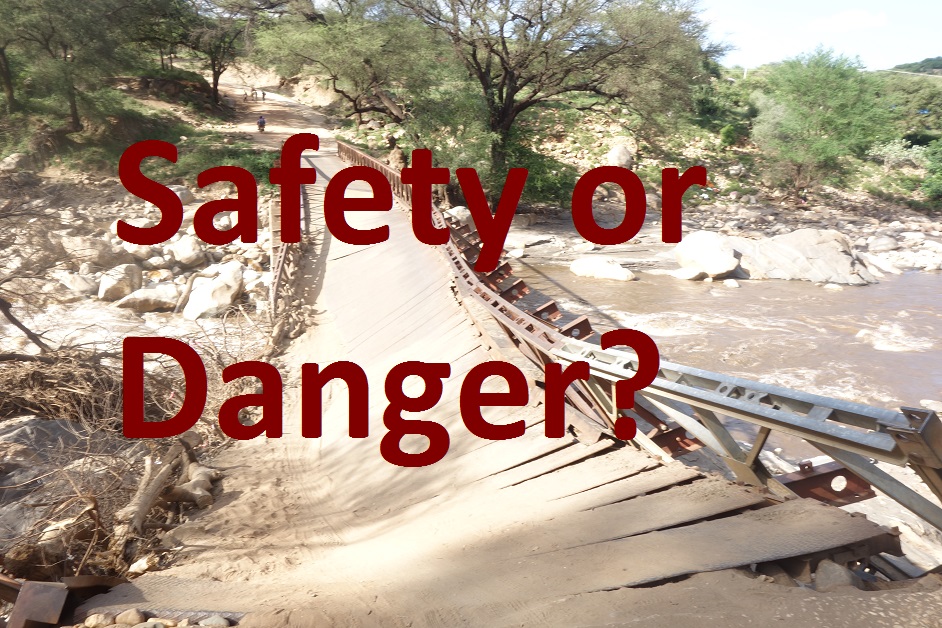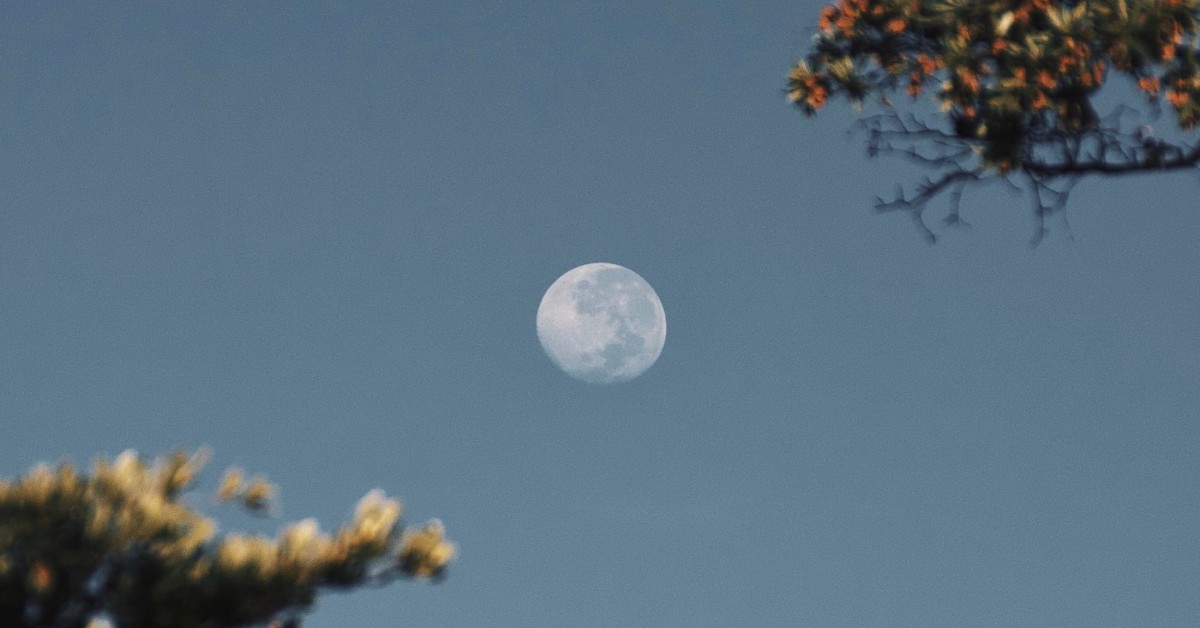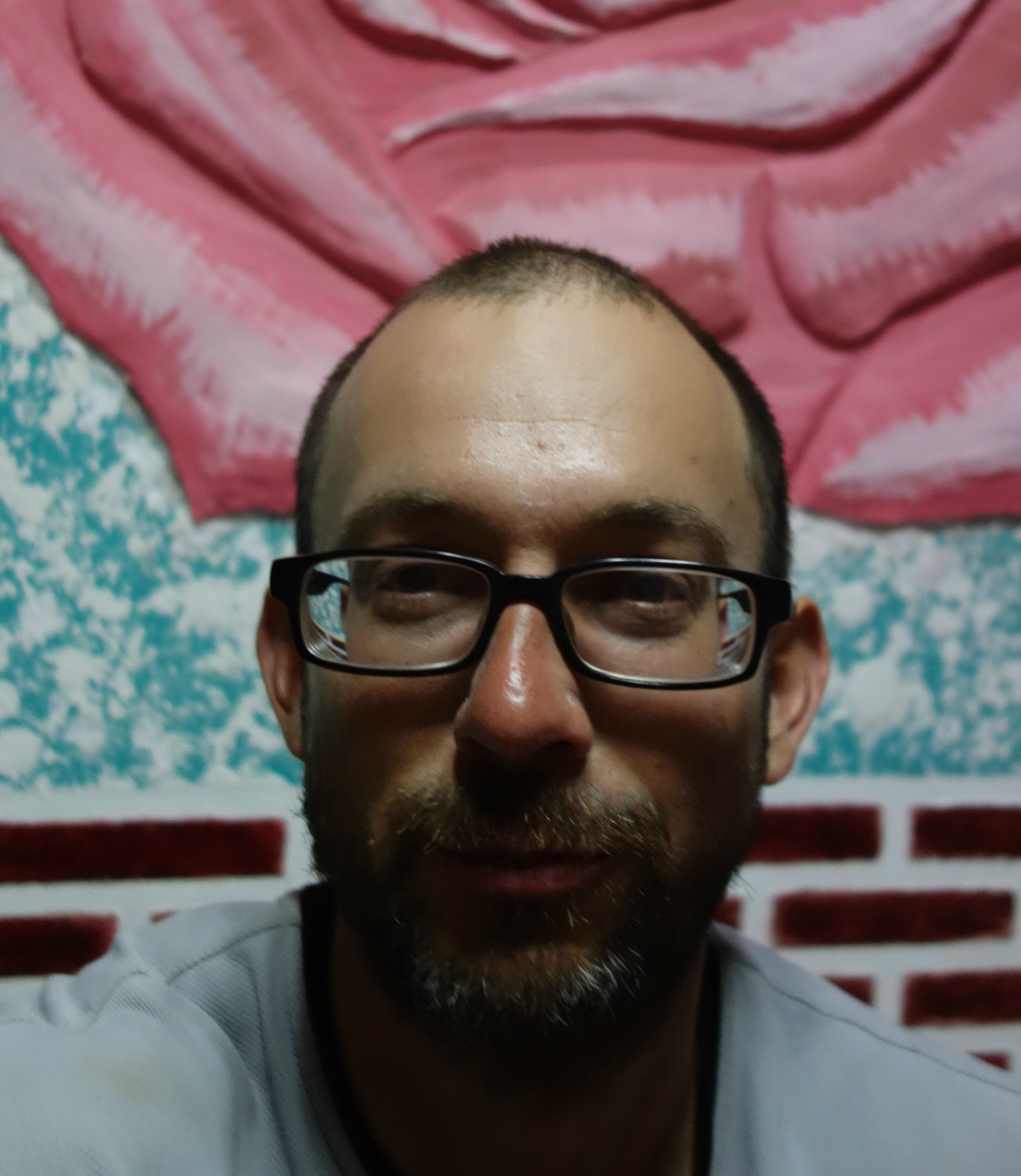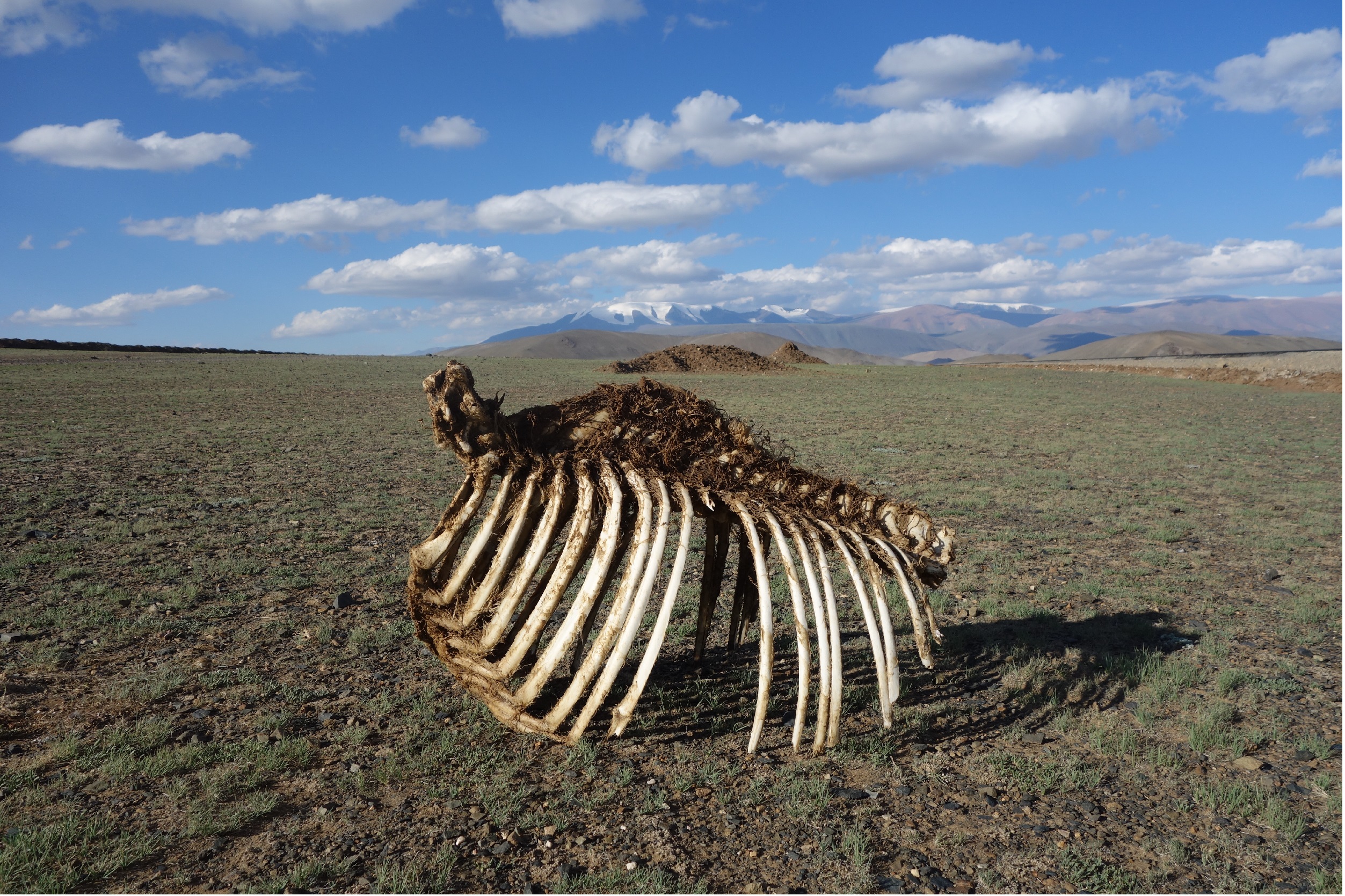Unhinged in Ethiopia Pictures
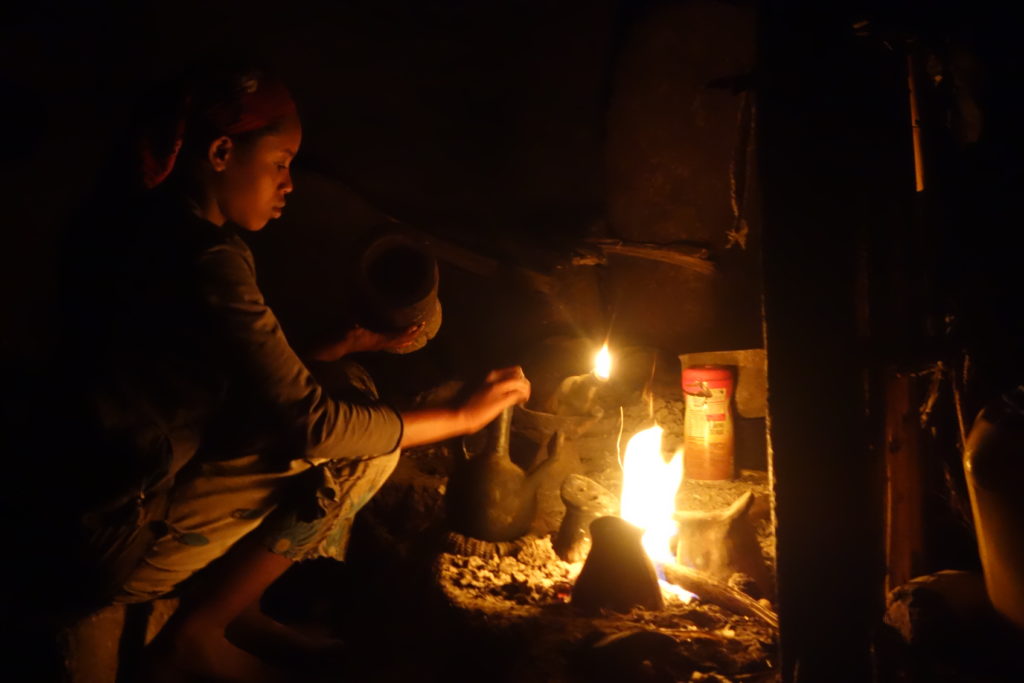
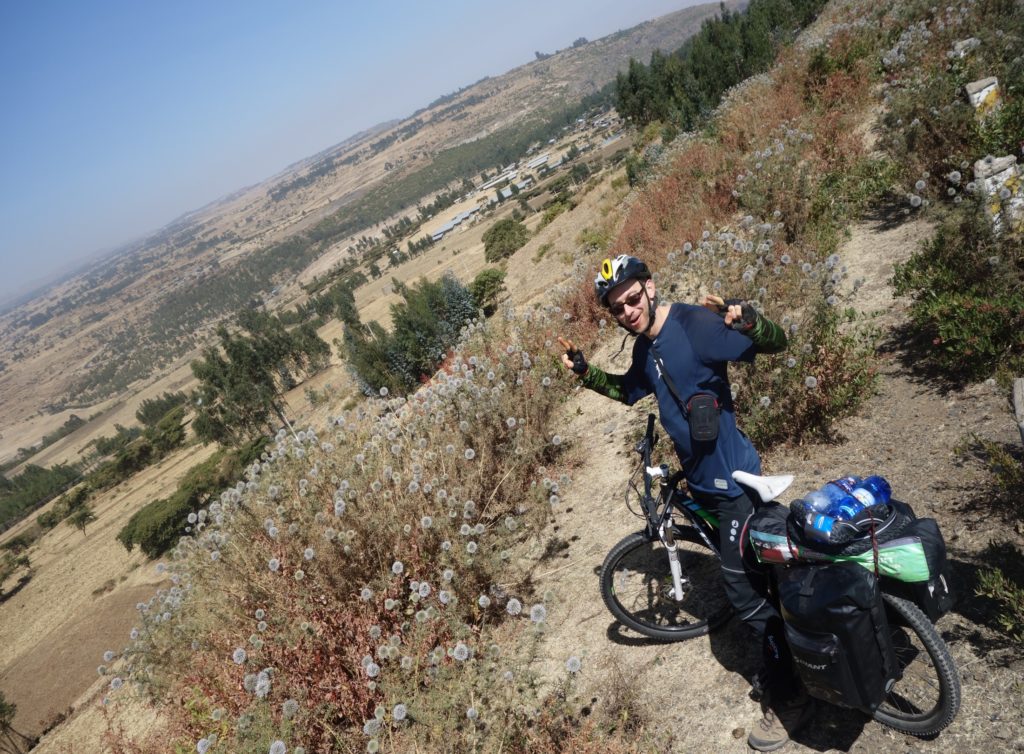
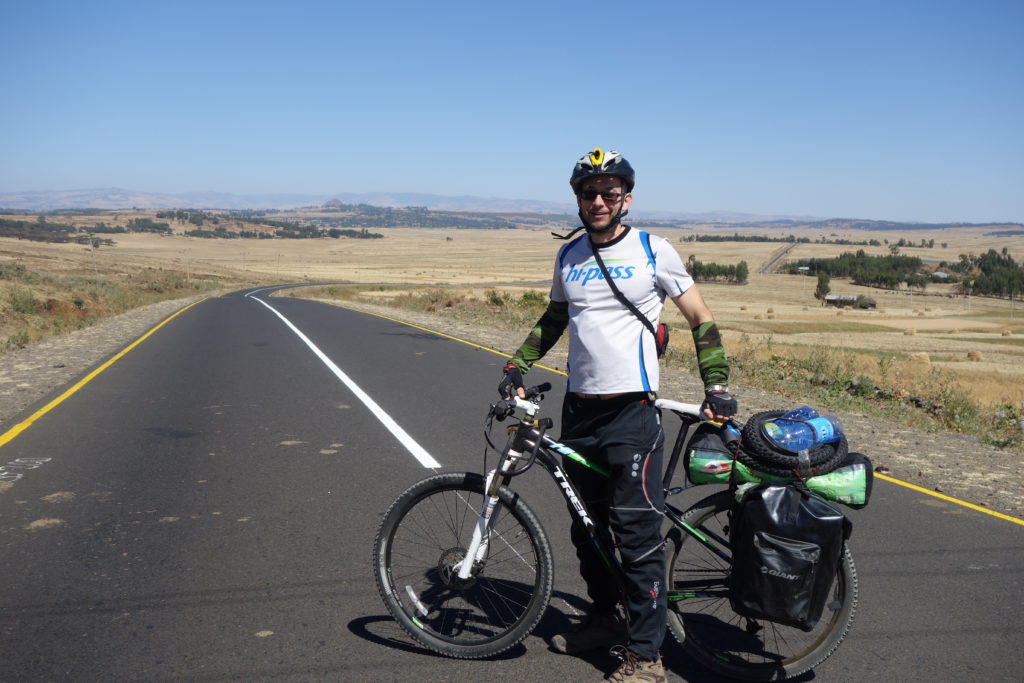
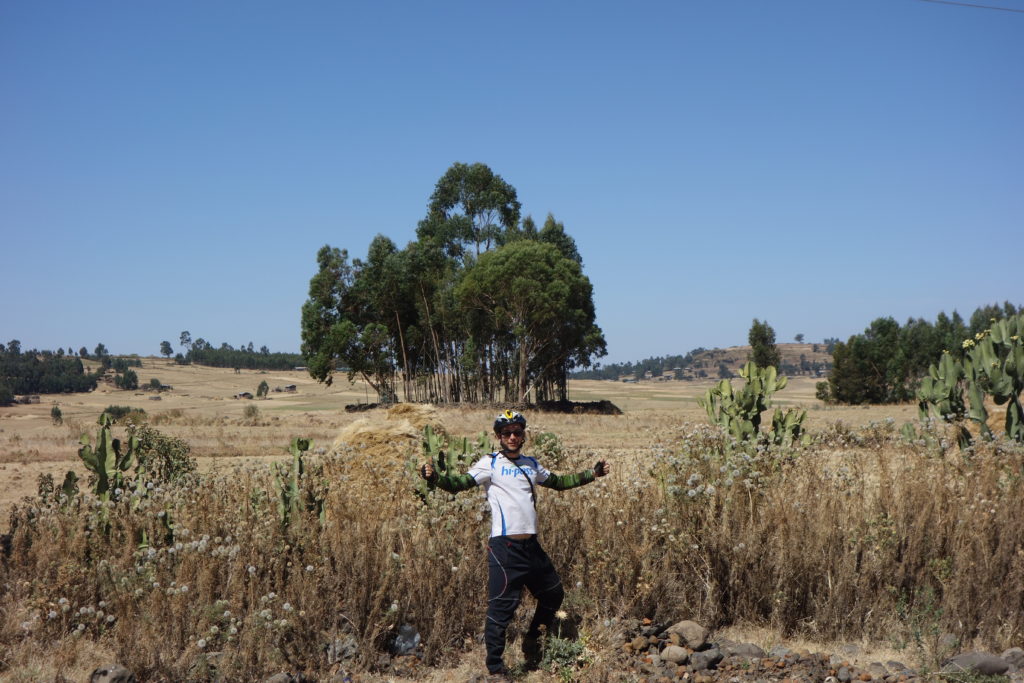
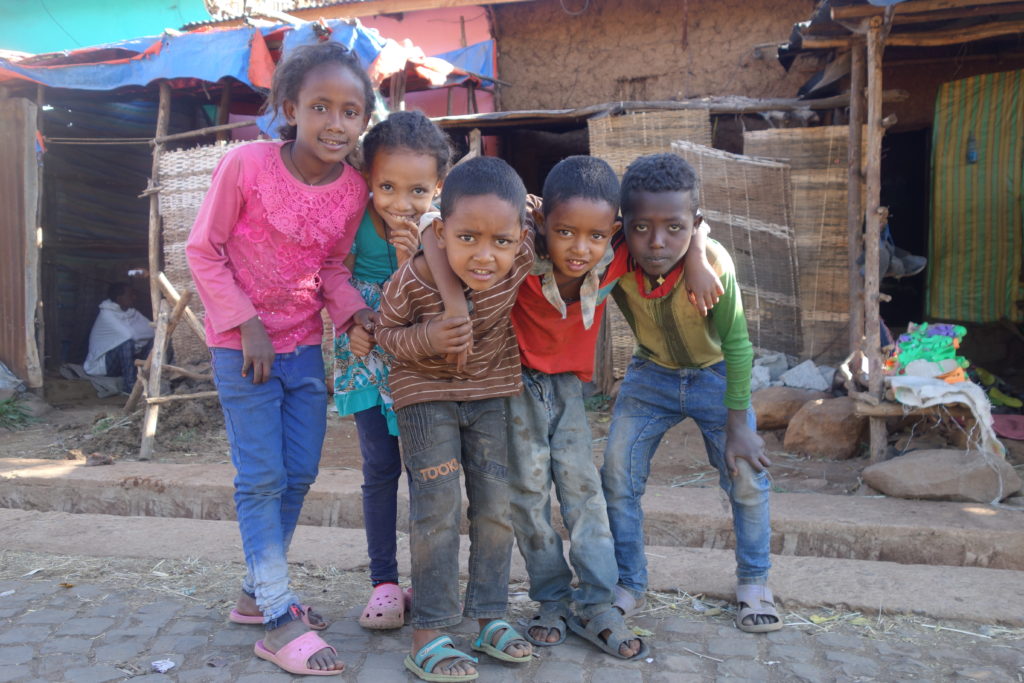
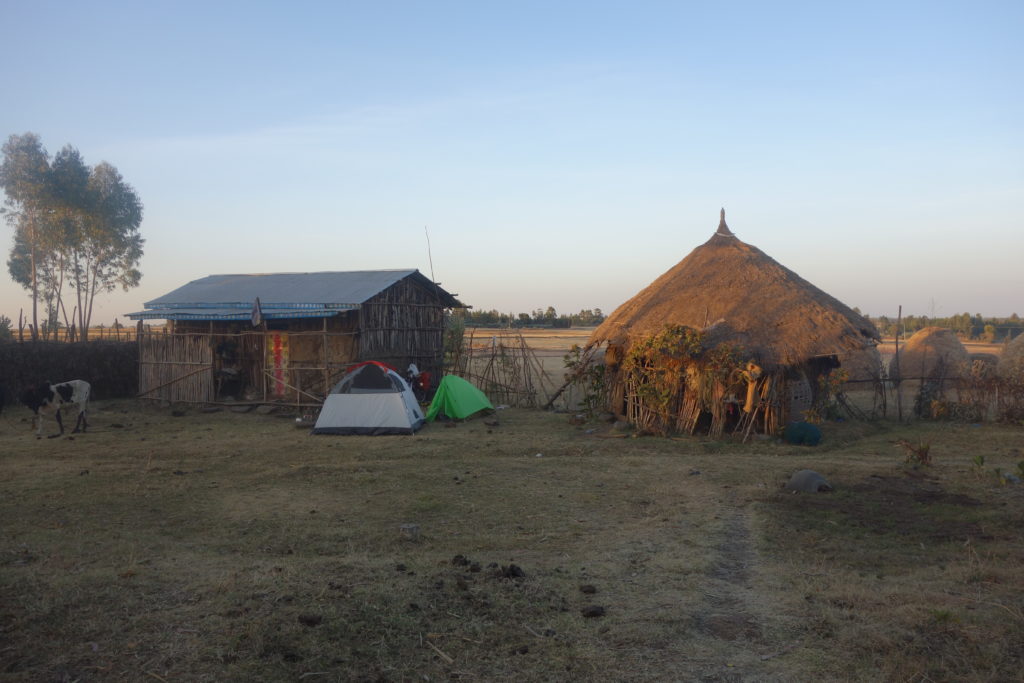
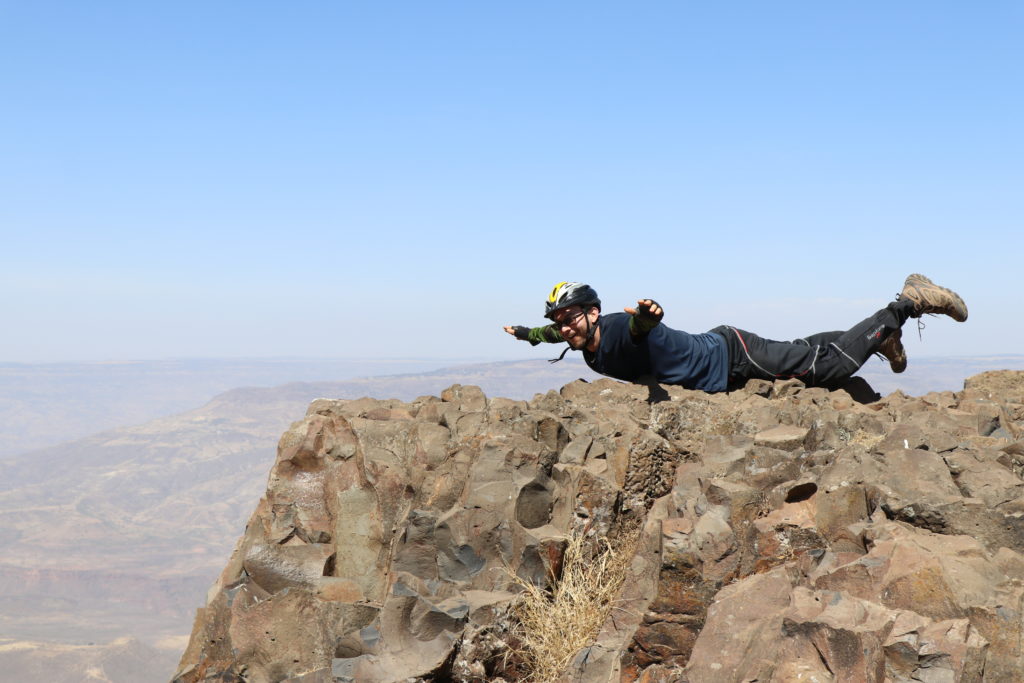
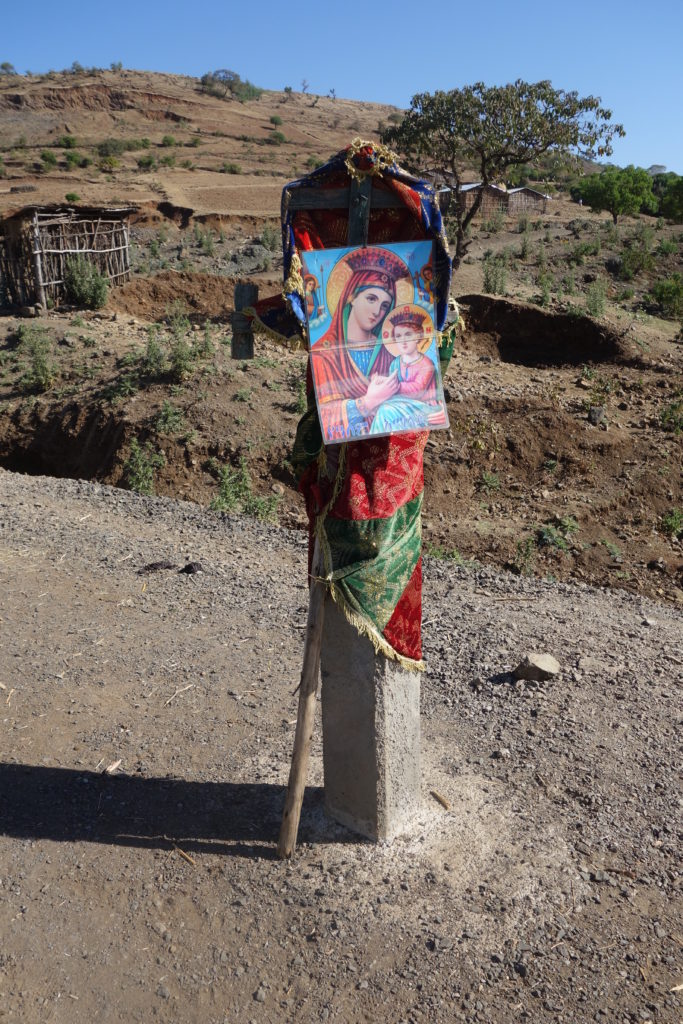
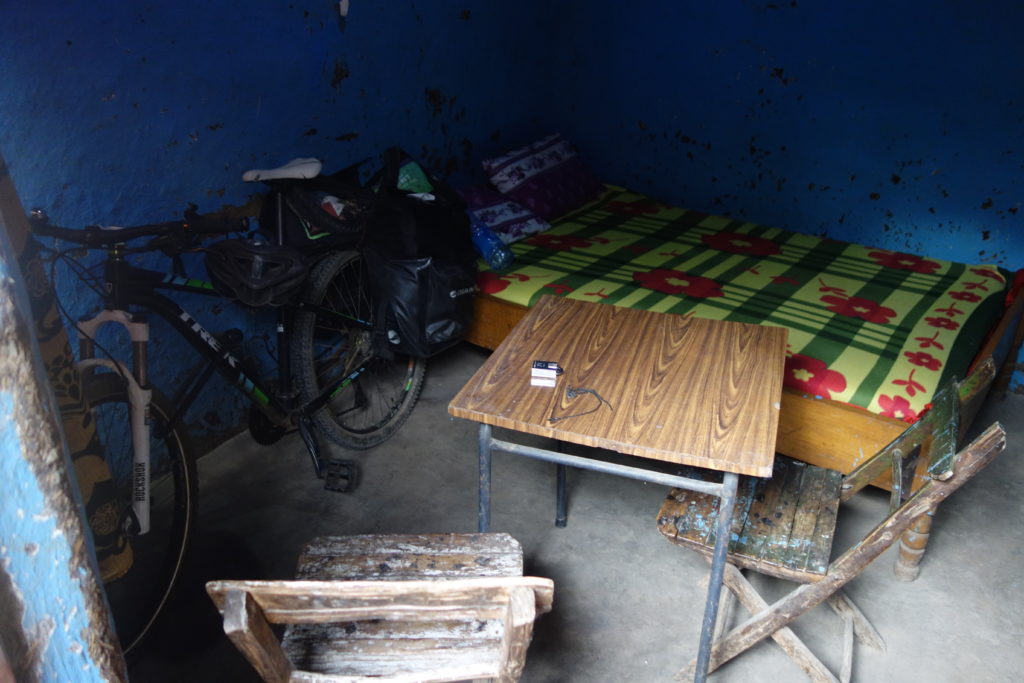
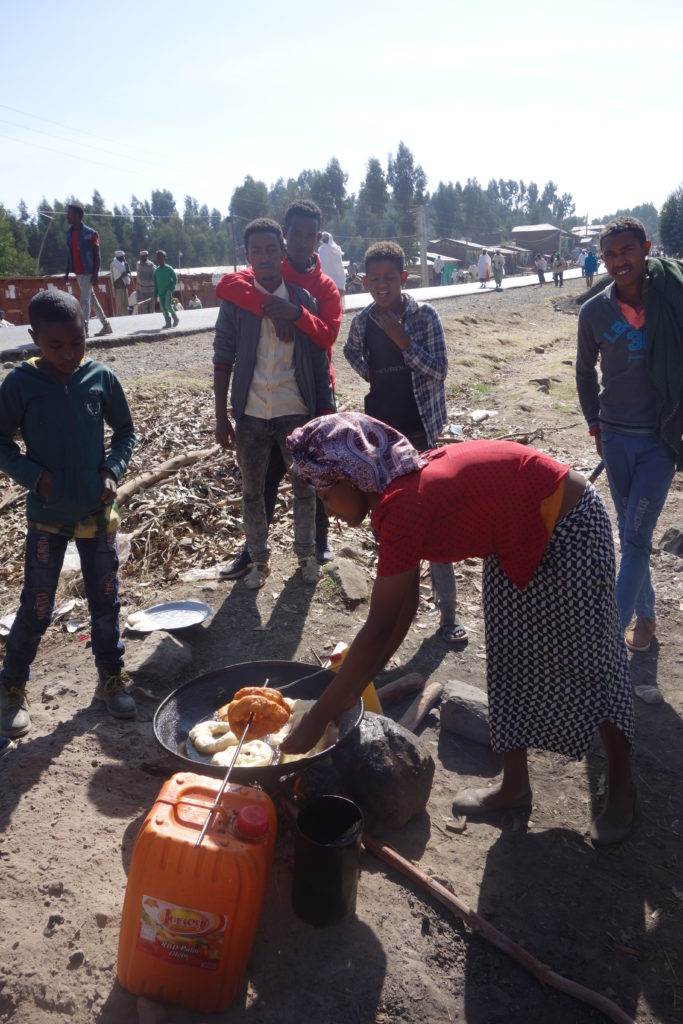
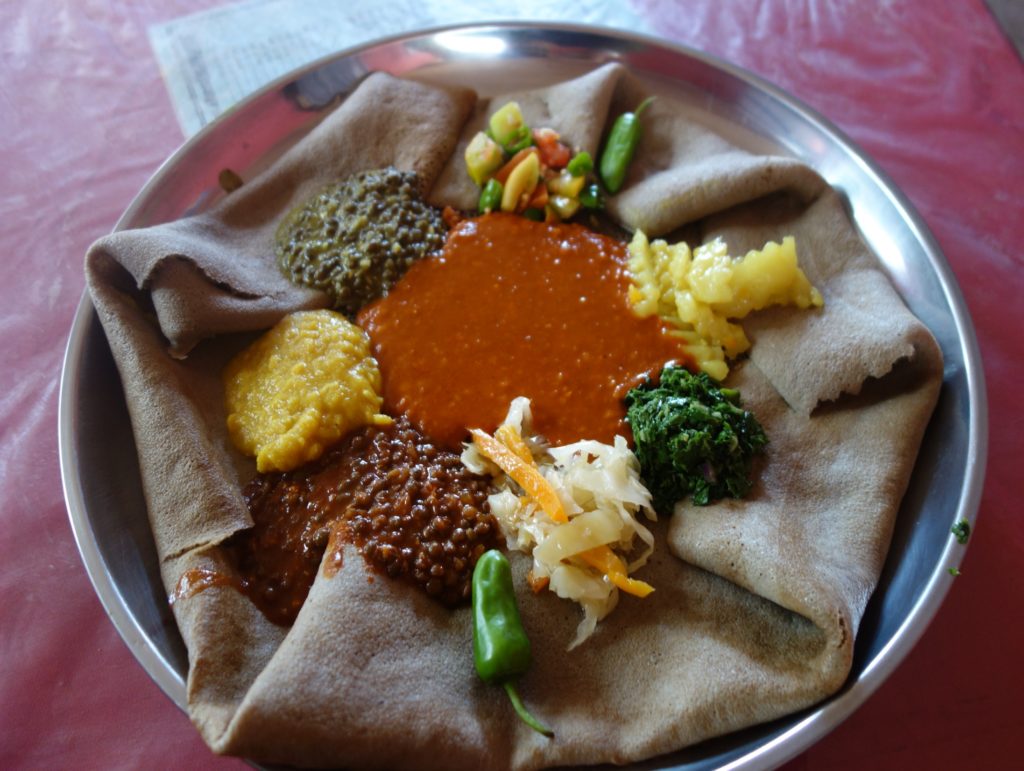
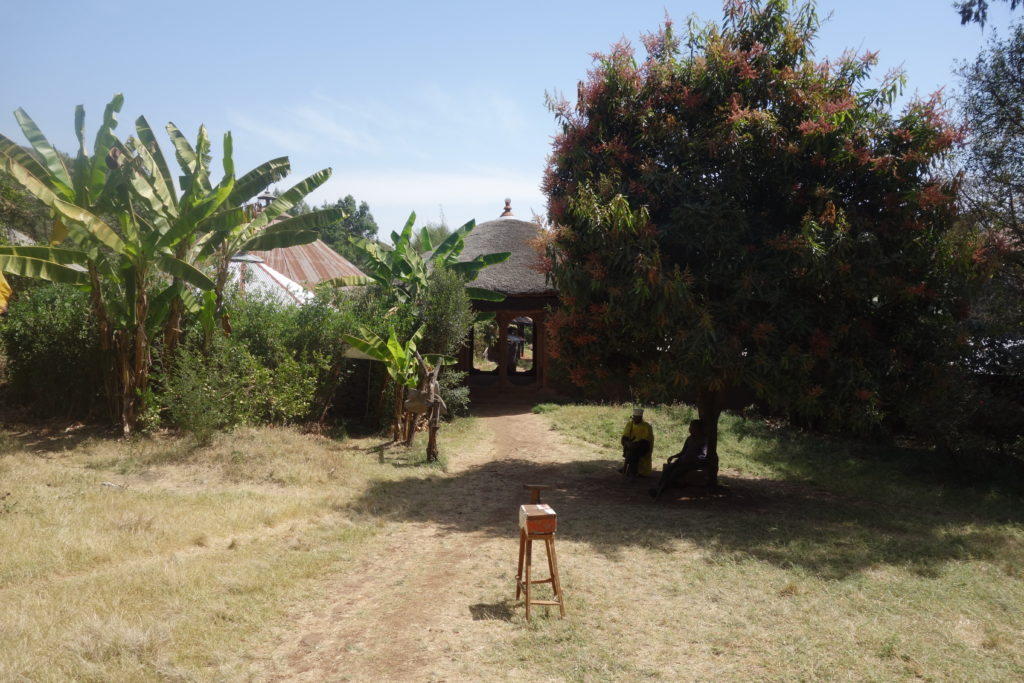
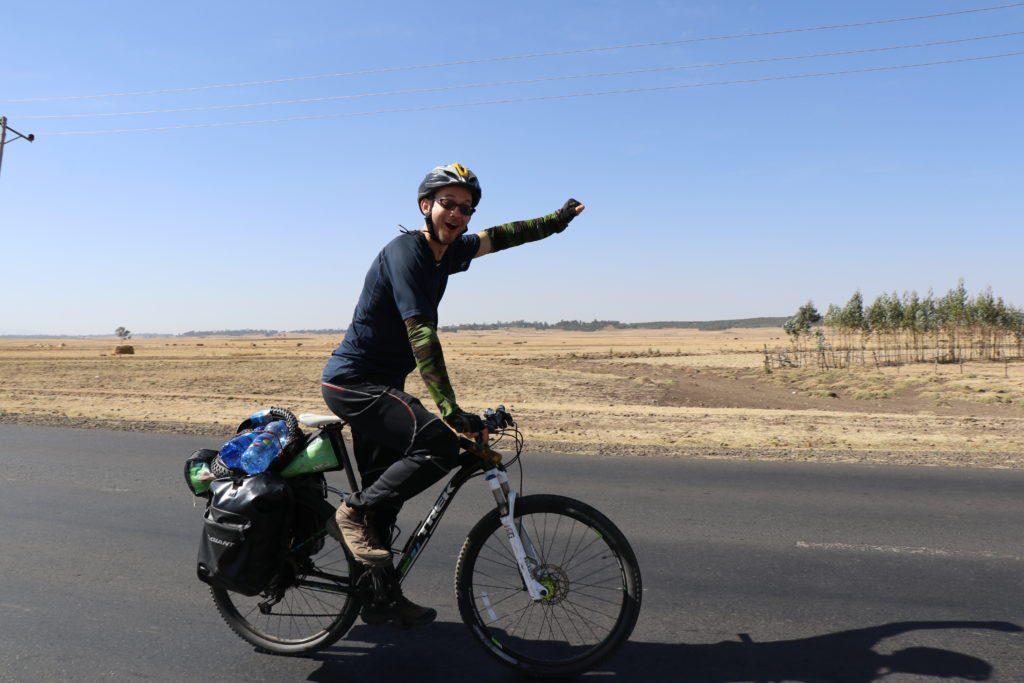
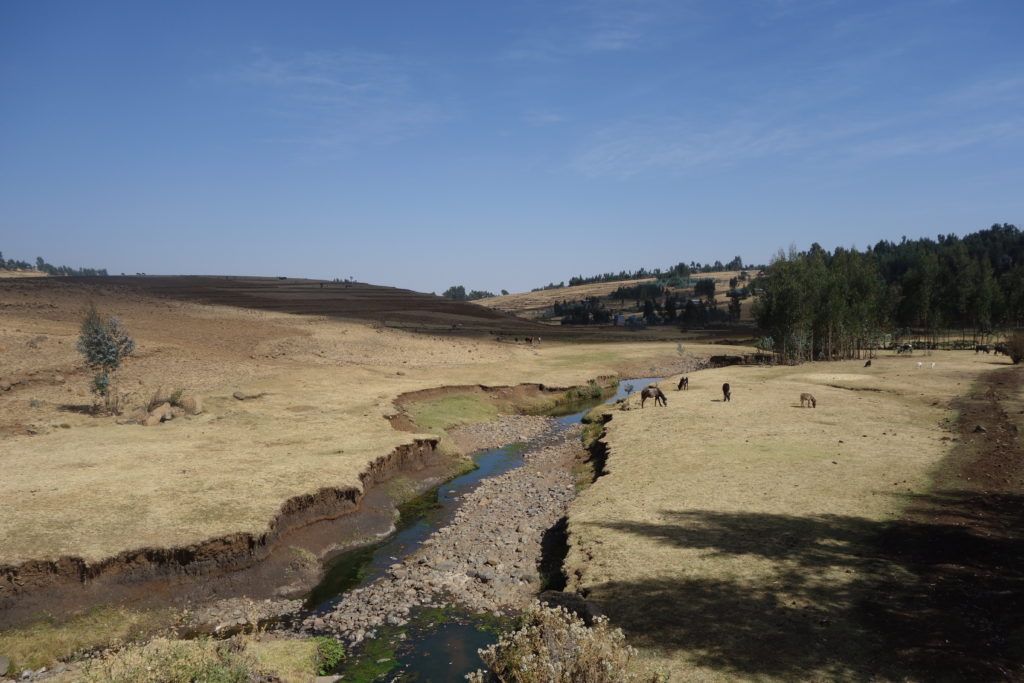
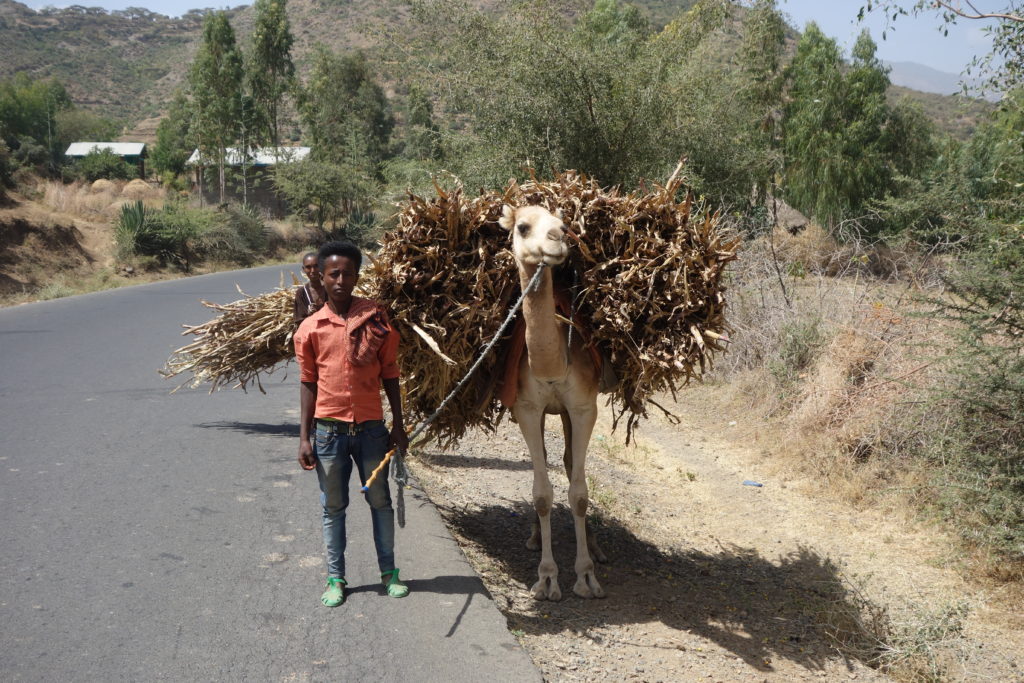
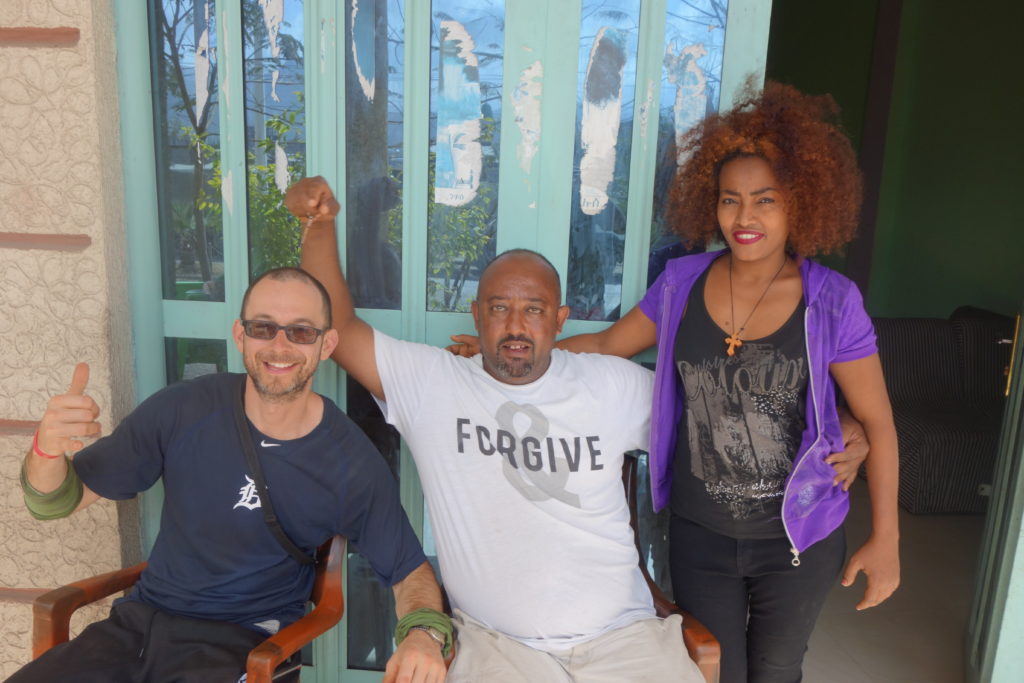
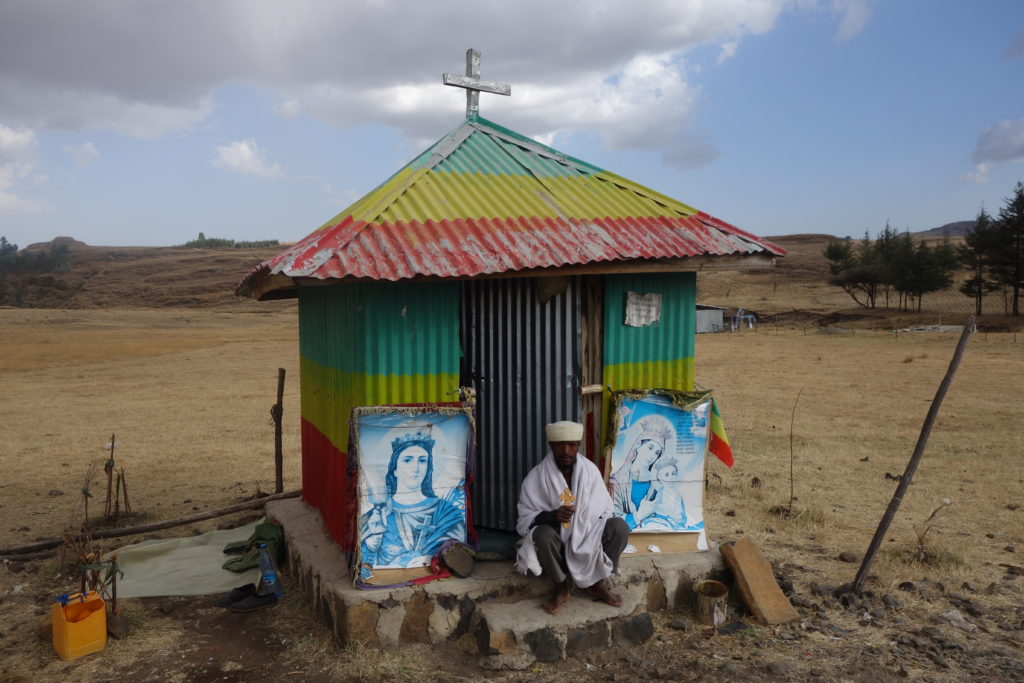
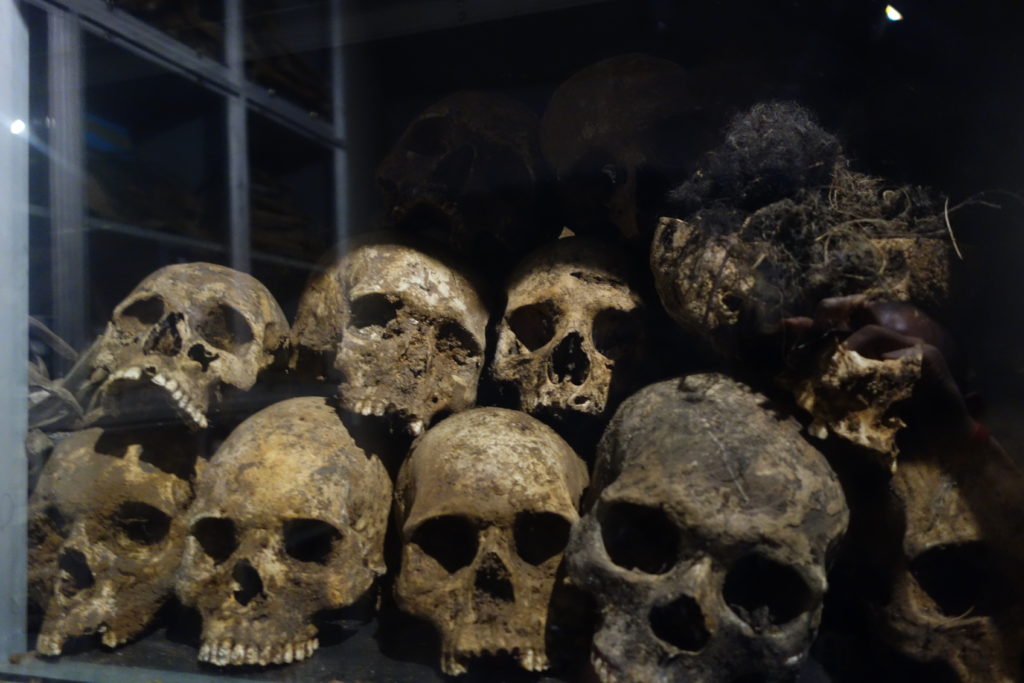
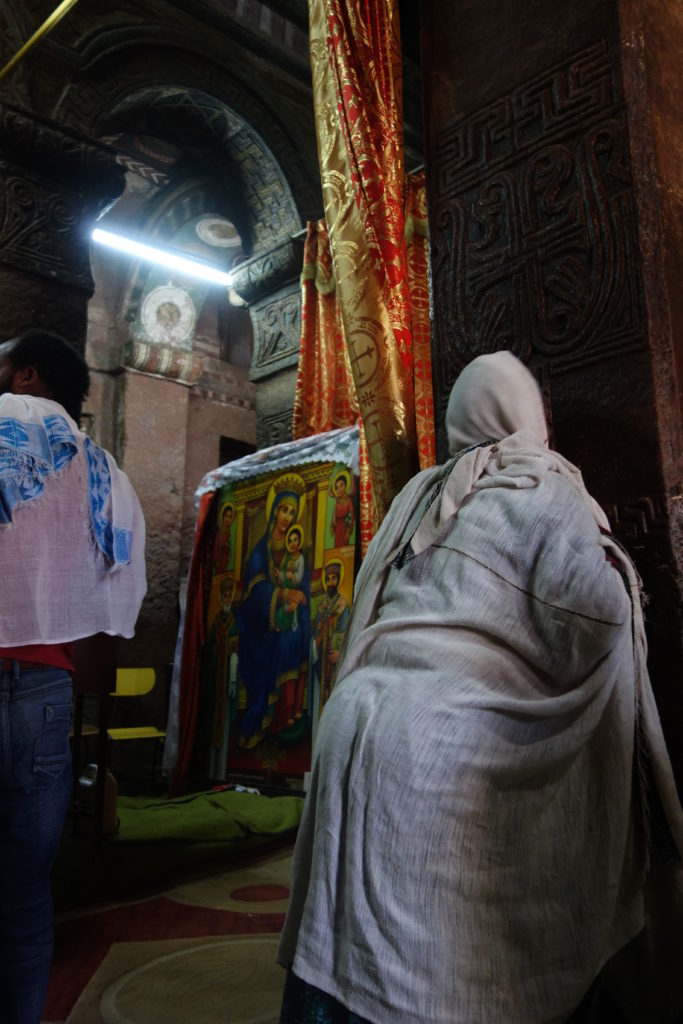
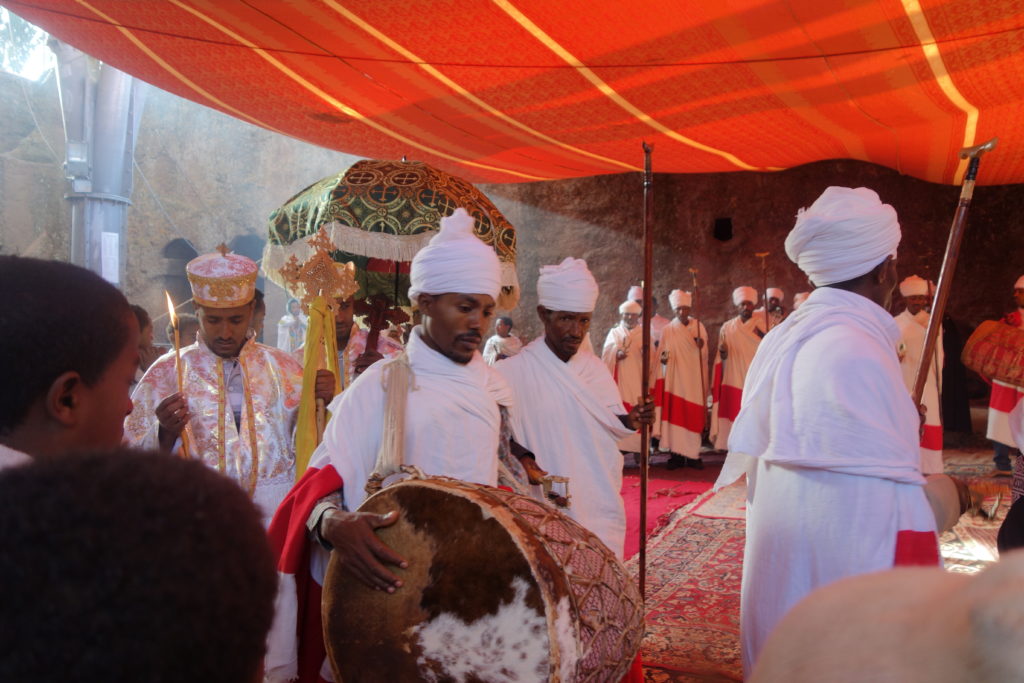
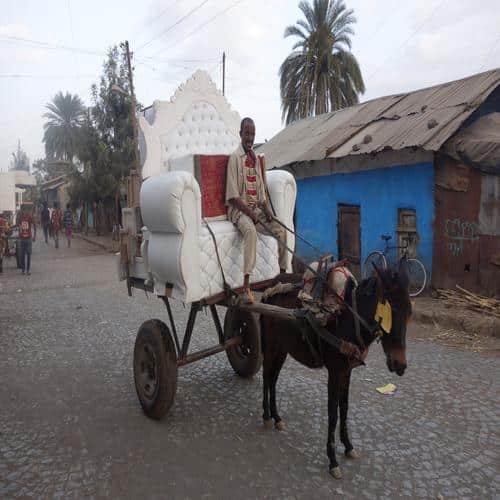
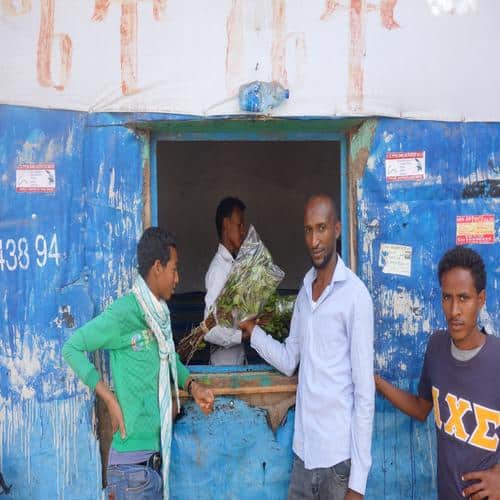
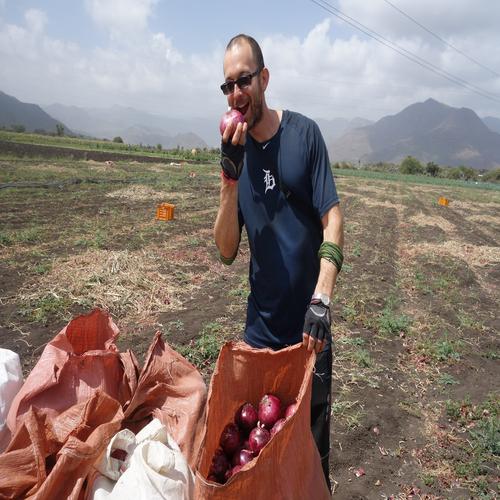
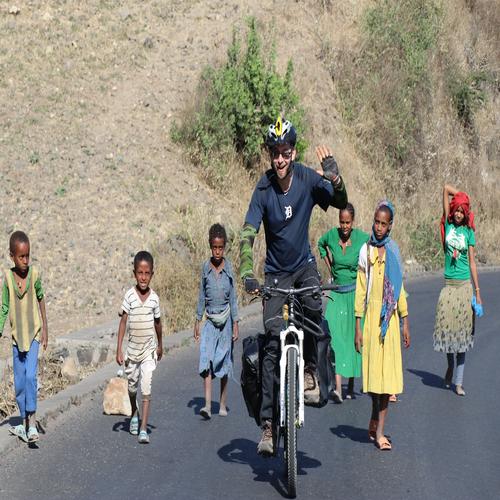
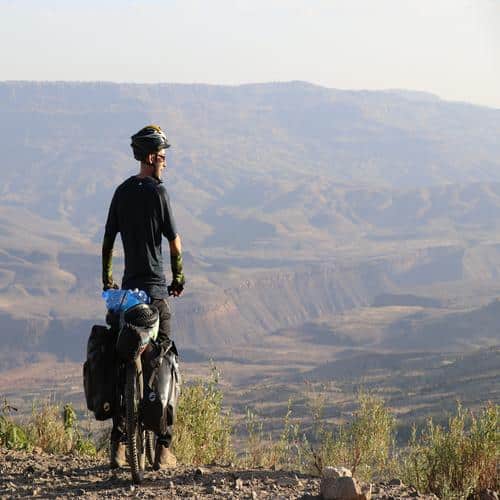
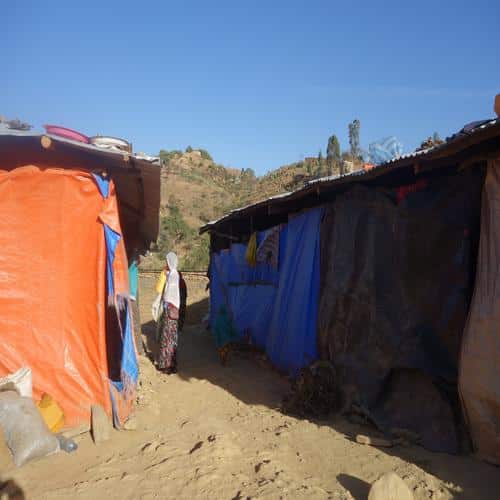
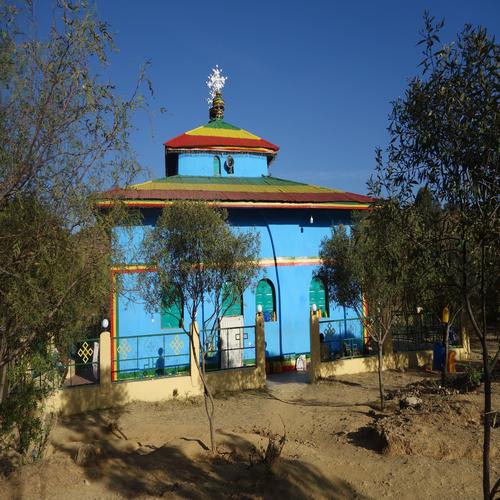
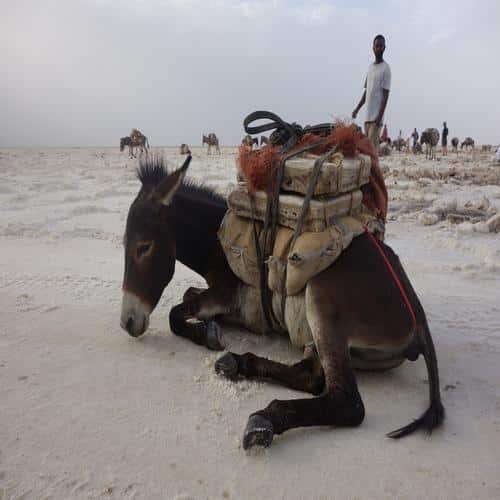
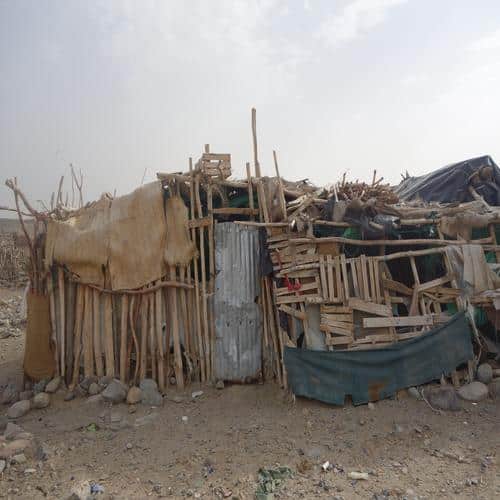
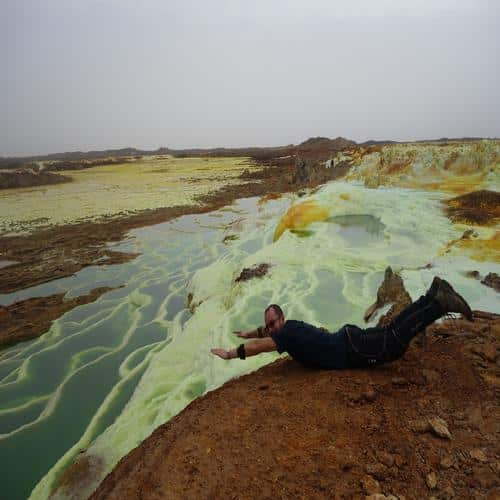
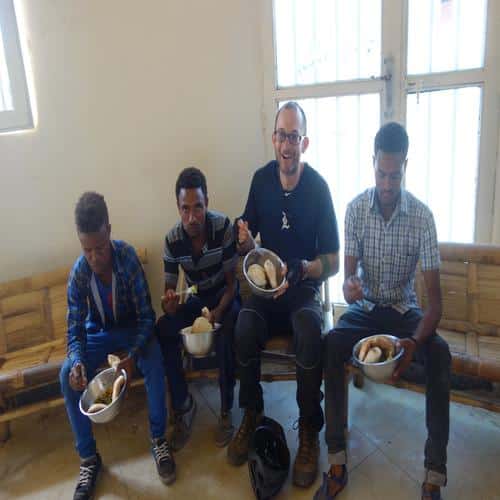
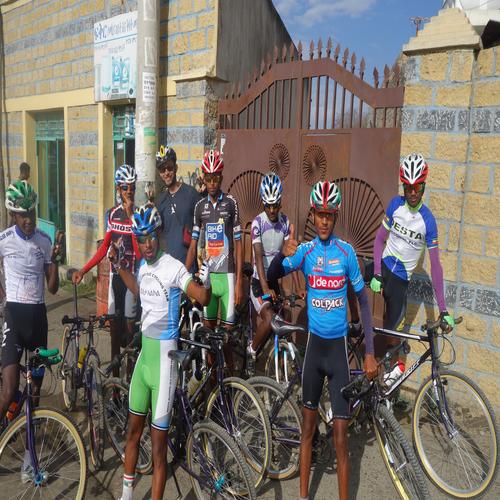
Bristol to Beijing By Bicycle With Josh Day (Part 2)
I’d like to introduce you to my good friend Josh Day via a podcast conversation. Josh and I met while I was riding my bike in the Altai Mountains in Russia along a roadway that leads to the Mongolian border. We ended up hitting it off and cycled together for over one week as Josh taught me Russian, (originally from England, he learned the language by studying in his tent at night, taking classes in Kazakhstan, and listening to language learning audio while pedaling in Central Asia and Russia), provided insight into the world’s largest country through his language skills, and cooked me Russian buckwheat every evening for dinner.
Josh and I split up in Mongolia that August, as I had to go back to work in Korea, but he continued cycling through Mongolia and into Siberia during winter (while sleeping outside every evening) before taking a boat from Vladivostok (a city in the southeast part of Russia) to South Korea. After cycling for a few days in the Gangwon province of Korea, he and his bicycle appeared outside of my apartment building in Seoul in December, where he rested and refueled with kimchi stew from my neighborhood restaurant and ramen noodles from the local convenience store.
Josh has many stories to tell and our conversation lasted nearly four hours. In order to break things up a bit, our talk was split into two episodes- this is part two.
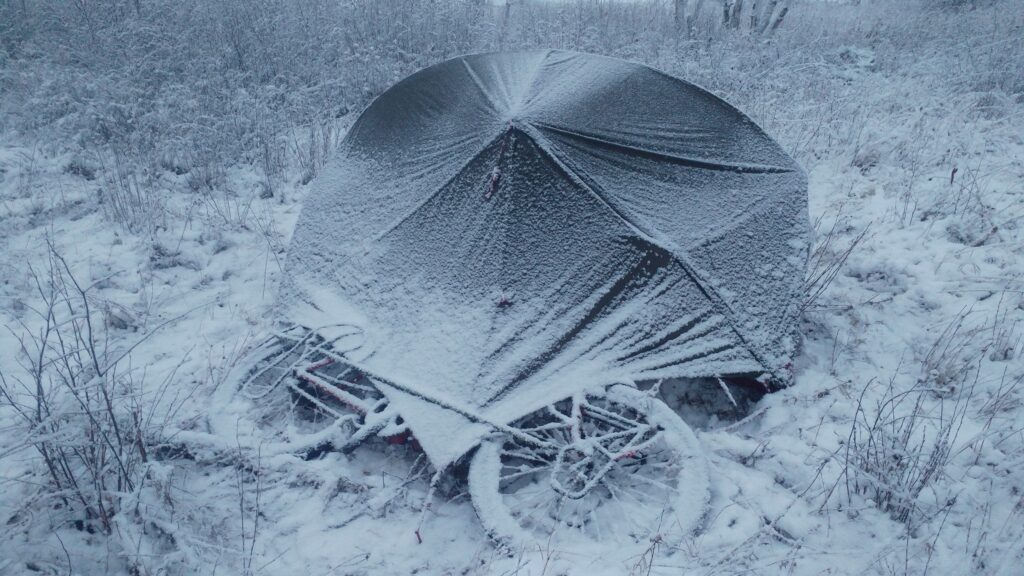
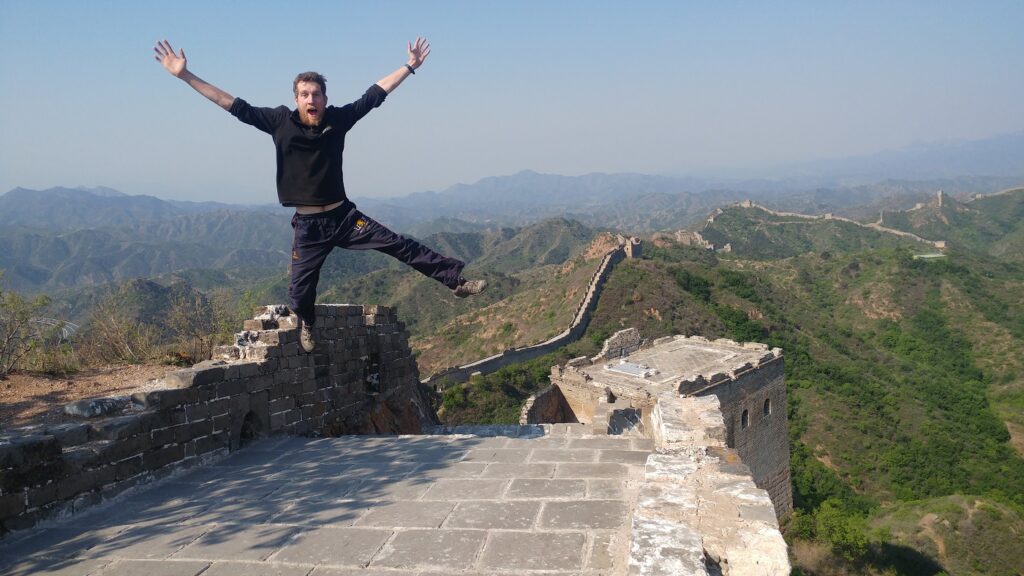
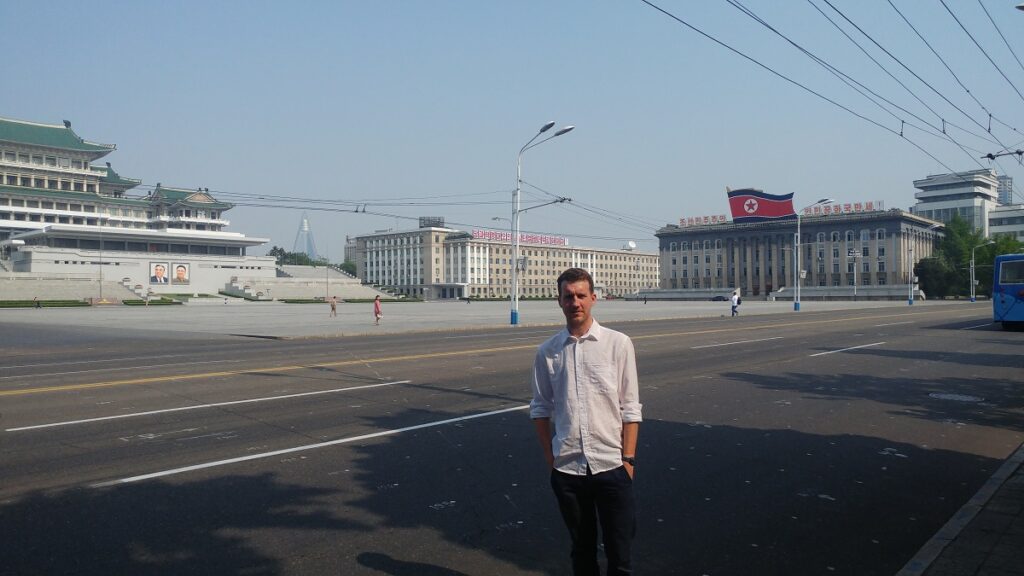
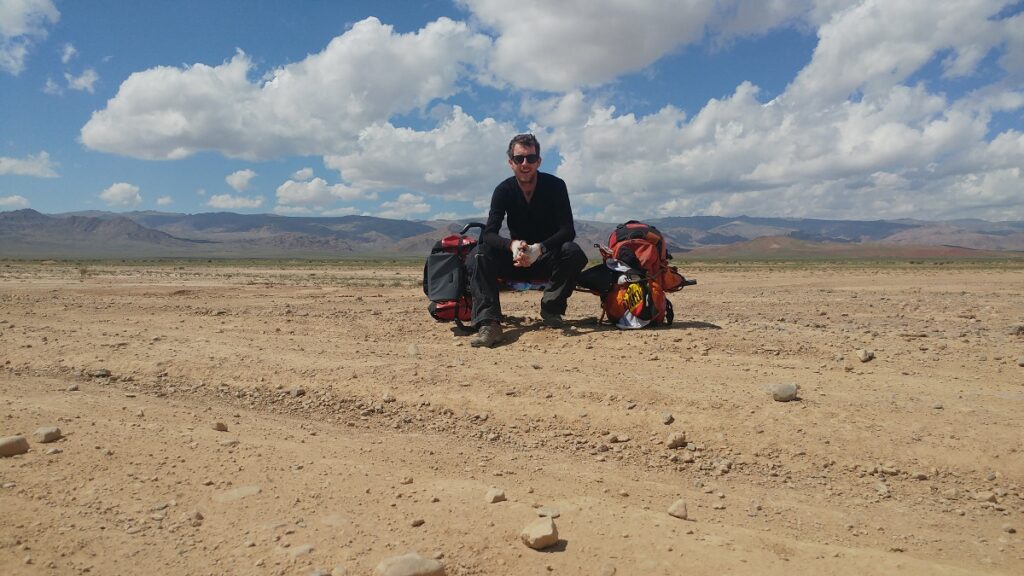
Bristol to Beijing With Josh Day- 2 Years and 25,000 Kilometers on a Bicycle-Part 1
In 2017, Josh left his front door in England on a journey of a lifetime to cycle the length of Eurasia and travel from Bristol to Beijing. 2 years and 25,000km later he arrived, having crossed the Kyzl-Kum desert, the Mongolian Steppe and the frozen wastes of Siberia. During his trip he dodged gun-toting border guards, fished out scorpions from his tent and endured nights of -27 degrees Celsius (-17 Fahrenheit), but came out the other side with a new appreciation of humankind’s generosity and a hatful of stories for the pub.
He now lives in the north of England, getting out into the hills to cycle, run and camp as often as he can, while taking a few months off a year to get out there on longer adventures.
Josh writes at cyclingfordays.bike and is on social media @cyclingfordays.
You can support the podcast by subscribing and leaving a review on Apple Podcasts, Google Podcasts, Spotify or your favorite podcast app.
Email me at intrepidglobalcitizen@gmail.com if you have an inspirational adventure story you’d like to record or reach out to share your thoughts and feelings about any of the episodes.
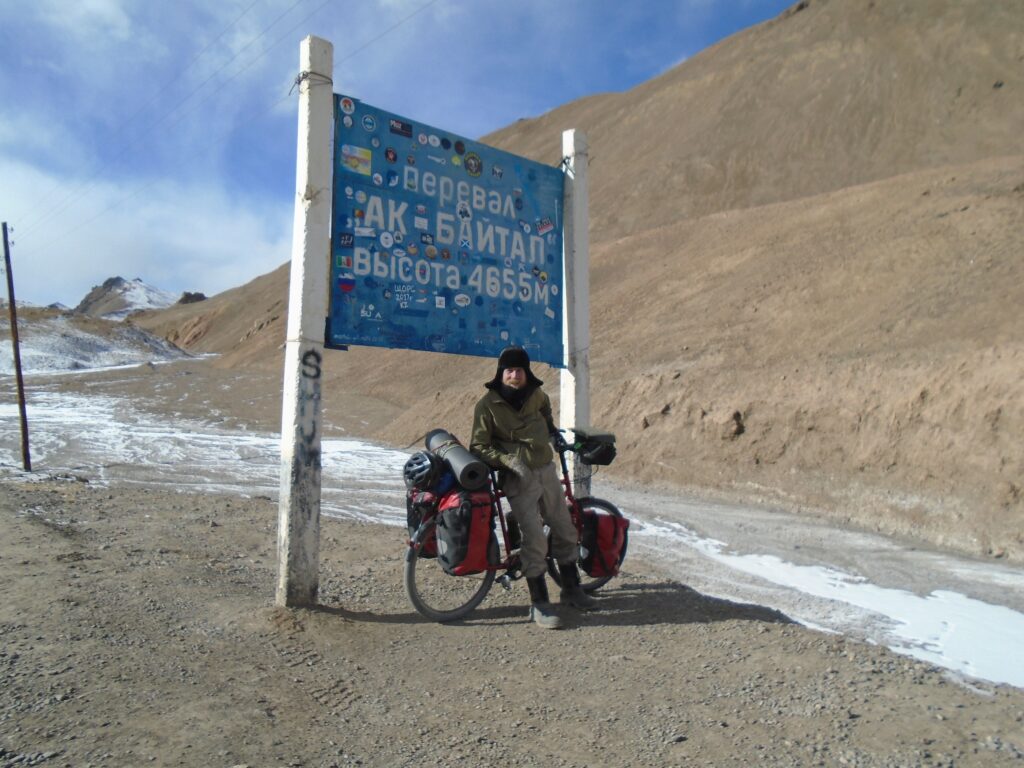
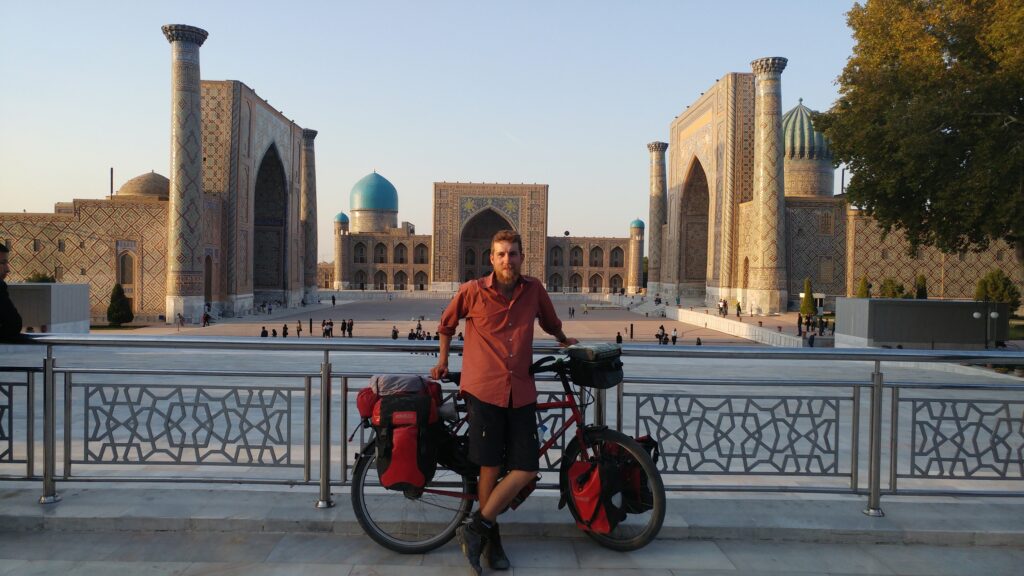
Bicycling the Political Divides in the United States- Anne Winkler-Morey
Anne Winkler-Morey has a PhD from the University of Minnesota and taught history and ethnic studies at colleges and Universities in the Twin Cities for three decades. In the 1980s she was the Director of the Central America Resource Center in Minneapolis and in 2010 she was instigator of the National Ethnic Studies Week. Her Minneapolis Interview Project includes 100 life stories with a social justice lens. She lives in Minneapolis with her spouse, David. In 2011-2012, they rode the contiguous perimeter of the United States. Allegiance to Winds and Waters: Bicycling the Political Divides of the United States is her story of that trip.
“I have been thinking about super-spreader events. Not the kind that makes hundreds of people sick, but the kind that transforms lives in a good way. Justice-rippling events: prayer vigils, Zoom gatherings, marches, rallies at the Capitol, where we the people, super-spread our messages of the world we are building. Though we may never trace each drop and wave — we know, there will be ripples.”
-Anne Winkler-Morey-
Find the book here- https://annewinklermorey.com/
The Minnesota Interview Project- https://turtleroad.org/
You can support the podcast by subscribing and leaving a review on Apple Podcasts, Google Podcasts, Spotify or your favorite podcast app.
Email me at intrepidglobalcitizen@gmail.com if you have an inspirational adventure story you’d like to record or reach out to share your thoughts and feelings about any of the episodes.
Bikepacking Races and Life With Steve O’Shaughnessy
In this episode My Back 40 Podcast host Steve O’Shaughnessey and I talk about the great outdoors, bikepacking races in North America, mental health, and the wisdom gained from being on a bicycle.
Steve has raced the AR 700, a 700 kilometer gravel race through the Alberta Rocky Mountains, the BC Epic 1000 in four days and four hours while raising money for The Masaka Cycling Club in Uganda.
As I type these words he is now in the midst of action on The Tour Divide, which roughly follows the Great Divide Mountain Bike Route (GDMBR). The route crisscrosses the Continental Divide from north to south starting in Banff, Alberta, Canada and finishing at the US/Mexico border in Antelope Wells, New Mexico.
Check out Steve’s podcast at myback40.org and follow him on Instagram at the link below-
https://www.instagram.com/myback40_podcast/
You can support the podcast by subscribing and leaving a review on Apple Podcasts, Google Podcasts, Spotify or your favorite podcast app.
Email me at intrepidglobalcitizen@gmail.com if you have an inspirational adventure story you’d like to record or reach out to share your thoughts and feelings about any of the episodes.
Alaska to Argentina by Bicycle with Pierre Moreau
In this episode Pierre Moreau pauses for a breather in bear country, British Columbia to recap his journey across the Americas by bicycle. He celebrates his one year anniversary on the road with a stop at Diary Queen to record a conversation and recounts encounters with narcos in Mexico, camping next to volcanic eruptions in Guatemala, a wild boat ride from Panama to Colombia, and hiding from bears in northern Canada. Pierre’s story is a testament to human endurance and the desire to make your dreams a reality.
You can follow Pierre on Instagram at the link below-
https://www.instagram.com/pierre.qui.roule.2021/
Track his journey and take a look at his pictures and videos at https://www.polarsteps.com/PierreMoreau4/4017460-seattle-ushuaia
You can support the podcast by subscribing and leaving a review on Apple Podcasts, Google Podcasts, Spotify or your favorite podcast app.
Email me at intrepidglobalcitizen@gmail.com if you have an inspirational adventure story you’d like to record or reach out to share your thoughts and feelings about any of the episodes.
Trails, Trials, and Tribulations Across the USA with Roland and Julianna
Julianna has been cycling since she was seventeen, and has always had an adventurous heart with a love of travel. Roland has been cycling since the days of stingrays and banana seats, enjoys road trips and far-off places, and a love of film and editing. Together, now retired, they see themselves as bicycle tourists, travelers who who believe that bicycle touring is a comfortable, safe, and pleasurable way of traveling for people of any age. Their YouTube channel, Roland & Julianna: Bicycle Tourists, was created to share their adventures, and hopefully to get people excited to leave the house, get out of the car, and really experience this incredible world.
Please visit their YouTube channel at the link below-
https://www.youtube.com/c/RolandLeppekandJulianna
You can support the podcast by subscribing and leaving a review on Apple Podcasts, Google Podcasts, Spotify or your favorite podcast app.
Email me at intrepidglobalcitizen@gmail.com if you have an inspirational adventure story you’d like to record or reach out to share your thoughts and feelings about any of the episodes.
England to India by Bicycle in 1978- William Sp
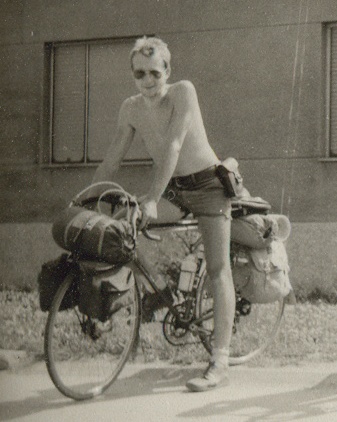
In 1978, William Spencer, author of the book “Far Sweeter Than Honey, Searching For Meaning on a Bicycle” cycled from England to India. Along the way, he was thrown from his bicycle while trying to avoid negligent drivers, chewed shirt buttons for water in Afghanistan, and was infected with hepatitis in Pakistan.
Despite all his setbacks he still managed to fast and write letters to friends and family every Sunday while maintaining a vegetarian diet.
Strap on your headphones tightly and listen as William shares the wisdom only a seasoned adventurer with several decades of meditation experience can accrue.
Find William’s book, “Far Sweeter Than Honey, Searching For Meaning on a Bicycle” at the links below.
Available as an eBook, paperback or audiobook. Find it on Amazon, iTunes, Google, and at any independent bookseller globally.
Amazon: https://amzn.to/3377f0v
Google Play: http://bit.ly/CF_FarSweeterThanHoney
Blurb from the book-
“This is the true story of a young man’s epic 8,000 mile bicycle journey from England to India. He encounters all manner of adventure and arrives finally in mystical India, with an understanding of what it means to be free.”
Follow William at the links below.
Facebook: https://www.facebook.com/groups/870373953763578
Instagram: https://www.instagram.com/england_to_india_by_bicycle/
You can support the podcast by subscribing and leaving a review on Apple Podcasts, Google Podcasts, Spotify or your favorite podcast app.
Email me at intrepidglobalcitizen@gmail.com if you have an inspirational adventure story you’d like to record or reach out to share your thoughts and feelings about any of the episodes.
Seoul Patch Podcast Interview
In this episode, three of my coworkers interview me about my adventure travel experiences in South Korea. It started fourteen years ago with a rusty, third-hand bicycle on a freezing winter day when I decided to leave home and put my nonverbal communication and beginner Korean skills to the test. No map, no smart phone, no GPS. I was armed with curiosity and a thirst for the unknown. After that I was hooked.
Check out the Seoul Patch Podcast on your favorite podcast app and leave my friends a review on Apple Podcasts, Spotify, Google Podcasts, or your favorite podcast app.
Visit the Seoul Patch Podcast website for more stories and lessons learned from a combined 45 years of experience living in South Korea.
http://theseoulpatch.com/
Email me at intrepidglobalcitizen@gmail.com if you have an inspirational adventure story you’d like to record or reach out to share your thoughts and feelings about any of the episodes.
Debs and Tom Cycle The World
This week’s conversation is with a very special couple whose love of nature and openness to change is infectious. Listen as they share priceless wisdom gained from over 300 days of cycling through Europe and the Deep South in The United States.
Debs spent her career running a bike shop in Scarborough, England. For years she met people who were cycle touring with no real plans but to have an adventure. Her desire for exploration strengthened with every encounter and she devoured every story about their trips. She wanted what they had, to ride day after day.
Tom worked improving parks, green spaces and play areas, helping connect people with the environment. A love of the outdoors, interest in photography, and thirst for adventure meant he was open to the idea.
When Debs’ brother Chris died suddenly, alive and well one day and gone the next, it hit home. Don’t delay, seize the day. There will always be a list of reasons not to do it, but there is one big reason that beats them all – life is a fast moving target.
After that, Debs sold the shop and started planning. They sold most of their belongings and packed the pannier bags. Tom finished his last project and the first day on the road approached quickly. They swapped their solid roof for a tent and began their journey on June 20th, 2021, weaving their way around the world while dodging COVID.
Sit back, strap on your headphones tightly, and enjoy the journey with Debs and Tom!
You can follow their adventure at the links below-
https://www.debsandtom.com/
https://www.youtube.com/channel/UCNu10xJEJIj4aY5RrMd1nyA
You can support the podcast by subscribing and leaving a review on Apple Podcasts, Google Podcasts, Spotify or your favorite podcast app.
Email me at intrepidglobalcitizen@gmail.com if you have an inspirational adventure story you’d like to record or reach out to share your thoughts and feelings about any of the episodes.
Tour Cycling Adventures- 21,000 Kilometers and 16 Countries With Roman Onillion
Tour Cycling Adventures- 21,000 Kilometers and 16 Countries With Roman Onillion
Roman Onillion is a photographer, adventurer, YouTuber, and blogger who has been covered in mud on the Pamir Highway in Kyrgyzstan, pushed his bicycle through sandstorms in Mongolia for seven hours while moving a whopping fourteen kilometers, and was accosted for money along the Kazakh border with China by the police only to be taken on a surprise tour of a nearby canyon.
He has also raised money for women who have fallen prey to forced marriages in Sierra Leone by eating a 1,000-year-old Chinese egg and taking a dip in the freezing waters of the world’s highest elevated lake in Tajikistan.
Roman is preparing for his next challenge coming up this June- a five hundred kilometer walking trip across Malaysia with his wife during the steamy monsoon season while picking up garbage in order to inspire others to keep our planet clean.
Subscribe to his YouTube channel and follow his adventures at the links below-
YouTube: https://www.youtube.com/c/DiscoverEvolution
Facebook: https://www.facebook.com/discoverevolution
Instagram: https://www.instagram.com/discover_evolution/
Enjoy the conversation and go make your life an adventure!
You can support the podcast by subscribing and leaving a review on Apple Podcasts, Google Podcasts, Spotify or your favorite podcast app.
Email me at intrepidglobalcitizen@gmail.com if you have an inspirational adventure story you’d like to record or reach out to share your thoughts and feelings about any of the episodes.
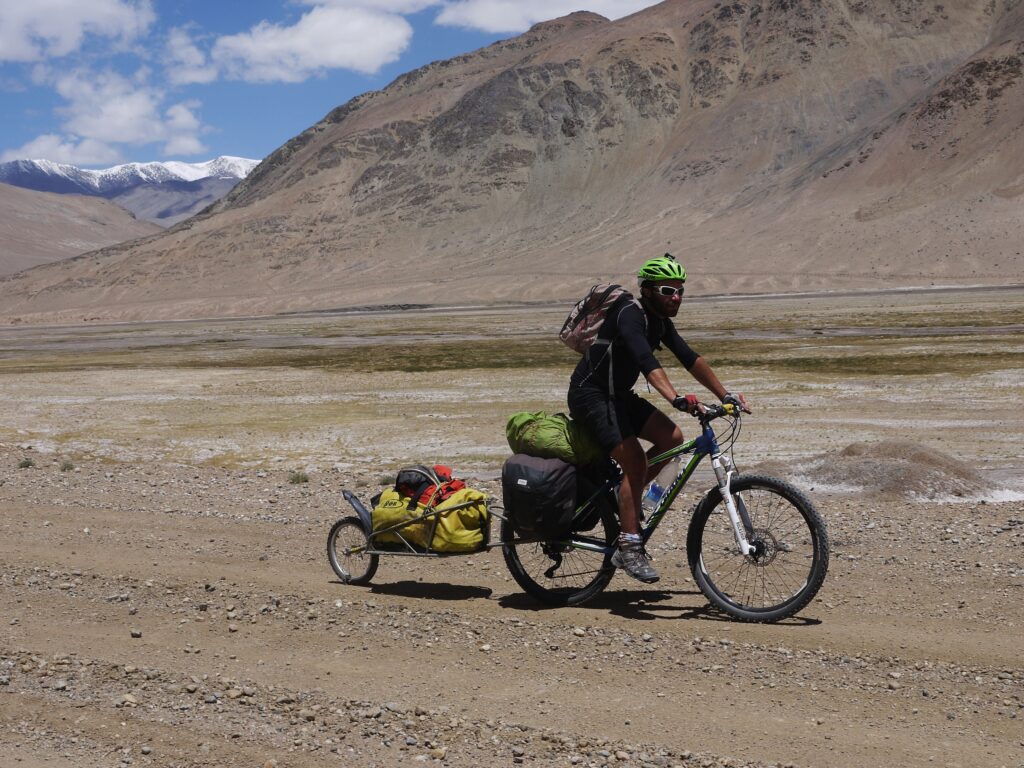
Cycling in Bangladesh-The World’s Friendliest Country- with Fahadul Islam
Home to Guinness World records- the longest single line of moving bicycles at 1,186; and the fastest four-person, twenty four-hour, 1,670 kilometer (1,037 mile) relay, the cycling and adventure travel community in Bangladesh is thriving. In this episode, Fahadul Islam tells us about BD Cyclists, a non-profit social community that aims to promote healthy living and reduce traffic congestion and pollution by encouraging locals to get on a bike and pedal. I had the honor to stay with Fahadul and his family during my five week cycling trip in Bangladesh in 2017. It was there I learned the true meaning of friendship and hospitality. Be sure to visit Bangladesh for the adventure of a lifetime.
To find out more about the cycling community in Bangladesh, visit BD Cyclist’s Facebook Group or contact Fahadul Islam on Facebook.
You can support the podcast by subscribing and leaving a review on Apple Podcasts, Google Podcasts, Spotify or your favorite podcast app.
Email me at intrepidglobalcitizen@gmail.com if you have an inspirational adventure story you’d like to record or reach out to share your thoughts and feelings about any of the episodes.
Podcast Introduction
Welcome to the intrepid Global Citizen Podcast
Date- April 8, 2022
This episode is an introduction to the podcast and a chance to get personal with the host. George Balarezo, the Intrepid Global Citizen, is an adventurer, engineer, university lecturer, and writer who is striving to become a better global citizen. Educated as an engineer through books and office research, he had the audacity to leave his corporate job behind and embarked on a new venture as one who inspires South Korean college students, friends, and family and to live fearlessly. He has traveled by bicycle for over 15,000 kilometers throughout twelve countries in Asia, The Middle East, and Africa and enjoys life as an expat in Seoul, South Korea.
Come be part of this historical day and strap on your headphones tightly.
Please leave a review on your favorite podcast app, it will only take a few seconds and help me out a great deal.
“By three methods we may learn wisdom: first, by reflection, which is noblest; second, by imitation, which is easiest; and third by experience, which is the bitterest.”
-Confucius

Freedom in the Time of Coronavirus
Freedom in the time of coronavirus
Date- September 29th, 2020

Written by George Balarezo, Intrepid Global Citizen
10, 20, 40, 80. It was February 22nd, 2020, and I suddenly transplanted myself back to my university calculus class as I sat in a Nairobi guesthouse keeping a close eye on the sequence. Exponential growth meant the numbers would become out of control in only a few short weeks. My friends in South Korea had told me not to come back. “Stay where you are! Kenya is much safer for you and the university semester has been delayed for two weeks.” CNN and Al Jazeera screamed the same message. “South Korea is about to blow up into a deadly virus incubation center.”
Although I am very cynical about the mass media’s underlying intentions, advice from people on the ground threw my mind into a mental sparring match. I deliberated for several days while resting up from a month of dodging lions, elephants, and buffaloes, and battling sandy wind storms in the Kenya’s Turkana province. Return to Korea and dodge a virus? Stay in Kenya and ride it out while riding it out on my bike for two more weeks? I was free to make my decision, but my mind was a whirlwind of chaos.
Something told me I needed to go back. South Korea was not simply a place where I live, it was a place I referred to as home. I missed my life in South Korea too much and was willing to barricade myself in my tiny studio apartment for a few weeks. It didn’t seem like such a terrible option as I needed rest after cycling across Kenya for over one month. I had projects to work on, classes to prepare for, and friends to share stories with. As long as I had my apartment floor to sleep and meditate, an Internet connection to continue my travel writing, and a market full of fresh produce a ten-minute bicycle ride away all would be well, right?
I boxed up my bike and got on the plane. Usually, I feel relaxed, refreshed, and reinvigorated on the ride back to Korea after my cycling trips. Now my heart thumped, my breathing became short and uncontrollable, and my mind wandered into visions of horror. What am I doing? I was in a perfectly safe place, sunny and warm with friendly people everywhere and delicious equatorial fruits and vegetables spouting out of the ground all around me. Now I was about to walk into a burning building with no protection!
But I did have protection. A single KF-94 mask, one that I had used frequently in Seoul to combat air pollution. I had stowed it away in my bag for sun protection. I intended to cover my face on sunny days in Kenya instead of lathering myself up with chemical-ridden sunscreen. It was one of a rather elaborate mask collection I had at my disposal in my apartment in Seoul, and I grabbed it at the last second before leaving for the airport. It was still fresh and ready to protect me from viruses and germs.
I sat calmly at the airport with my mask hugging my cheeks and chin, but this wasn’t simply a quick trip over a few mountains and lakes, this was a twelve-hour cross-continental journey from Nairobi to Seoul. Planes are notorious for having poor air circulation and taxing your body through high altitude radiation, so I braced myself by swallowing extra zinc supplements and chomping on extra servings of spinach and mangoes moments before boarding.
As I made my way down the economy class cabin aisle, my hopes of an empty plane were thwarted as people kept piling in. They weren’t simply passengers either. They were all super spreaders. My eyes twitched in agony. Each sneeze, cough, and speck of flying saliva transformed me into an enraged beast ready to wring necks and throw fists. All compassion left me. Virus vision and germ detecting auditory powers enhanced, each bodily function had me twisting my neck to fire another nasal-flaring stare in a passive-aggressive punishment. Toddlers and mothers. Hunched over wrinkled men. Lean and energetic teenagers. They all became victims of my passive-aggressive facial expressions. Verbal communication was rendered useless as we didn’t share a common language. All I had were my piercing eyes of rage. My mind was in a completely reactive state, all freedom lost.
Each second became worse and worse. The more people boarded the plane, the more frequent became the horrible sounds of bodily functions gone completely wrong. I had visions of sprinting into the bathroom and force-covering their mouths with toilet paper. I had to do it now! Pretty soon the washroom would become the most contaminated place on the plane. How was I supposed to hold it for twelve hours?
Many people boarded the plane that day from a variety of places in the world. I am ashamed to say my mind reverted to the simplest path possible, one of discrimination. I became the very person I complained about and loathed. All of my world travel and stereotype shattering became undone in a few seconds. I scanned the plane for anyone of East Asian descent and told myself I needed to distance myself physically from them before the term “physical distancing” ever hit the airwaves. Africans safe. Caucasians safe. South Asians safe. Chinese, Japanese, Koreans? Stay away. Especially Chinese. I prayed that non-Chinese people would fill the surrounding seats.
On second thought, this wasn’t racial discrimination at all, it was “potentially infected people discrimination.” I love my friends in South Korea. I want nothing but health and happiness for my South Korean students. But more than anything, I wanted to stay away from those who were the most likely to be infected with the virus. If you had told me that people over the age of ninety years old were super spreaders, I would have sprinted in horror at the sight of cookie-baking, sweater-sewing grandmothers. If you would have told me that people with shaved heads were spreading the virus, I would have cringed in terror if His Holiness The Dalai Lama joined me on the plane that day, no matter how much peace and bliss was radiating from his soft smile.
I knew at the intellectual level that the likelihood of someone from Korea infecting me was extremely low. Out of a population of 50 million, only several hundred were confirmed cases. Actually, it wasn’t the number of confirmed cases I was afraid of; it was exponential growth. I was afraid of the unknown. How many people were actually infected in South Korea? What was the fatality rate? In late February, no one could answer those questions. I wished I had cut all my university math classes. Knowledge paralyzed my higher-order thinking and left me in a state of frenzy. All freedom lost.
My mind turned into a wild animal and I needed to calm it down. I sat in my seat and closed my eyes. A few rounds of controlled breathing through my mask slowed my heartbeat. My eyes slid shut and my nose finally stopped twitching. The tension in my arms and shoulders dissipated, and I became a fragile lump of mass. I dozed off for a few minutes before a woman’s handbag jabbed my forearm, spearing back into the conscience world. I reminded myself that I wasn’t my thoughts and needed to ignore the ones that didn’t serve me.
The plane was completely silent as we prepared for takeoff. The air felt heavy with tension as nervous energy radiated throughout the main cabin. I needed to liven up the atmosphere. If we were all going to die from this virus, we might as well go out smiling. I attempted to flirt with an Ethiopian flight attendant while using the survival Amharic I had learned a year before while cycling across her country, but my attempts were met with a scowl protruding through a masked face. They usually loved it whenever I raved about how much I adore Ethiopia in Amharic. Not this time.
A few minutes later, a heavyset man wearing shorts, a T-shirt, and a blue baseball cap plopped himself down two seats next to me. A KF-94 mask covered his face. This guy had to be an English teacher in Korea, why else would he have a mask like that? I thirsted for conversation and someone to share the uncertainty and nerves with and decided he would be the one.
“Hey. Do you speak English?”
“Yeah. I do,” he said while staring straight ahead, avoiding eye contact.
“Where are you from?”
“The United States,” he said in a monotone voice.
“Oh, great. So am I. How was your vacation? Where did you go?”
“Madagascar,” he said, eyes still avoiding me.
“Wow! That sounds amazing! How was it?”
“Yeah. It was good.”
“I would love to go there sometime! By the way, are you going to South Korea?”
“Yes. I am,” he answered abruptly. By this time I wondered why he was acting so cold and giving me one-word answers. Perhaps this was his way of dealing with the unknown of heading back to a virus-ridden land.
“Which part of Korea are you going to?”
“Daegu,” he said, finally looking at me with fear-stricken eyes. That was it. The outbreak epicenter that appeared in the world news every day. He was heading to the eye of the storm. I probably would have been shaken up if I had to walk down the contaminated city streets of Daegu.
“Yeah. My university is making me come back, even though we won’t be starting for a few weeks. I am not happy about that.”
“Oh…Your university is making you come back?”
“Yeah.”
I decided I would leave him to his thoughts since he didn’t seem willing to engage in small talk. I pulled out my book and silence ensued for the rest of the ride. No talking. No room for humor or socializing. I kept my germs and thoughts to myself.
I returned to my apartment in Seoul as the numbers continued to climb. I became stronger and more energetic as the fourteen-day incubation period after the plane ride passed. Expats living in South Korea fled the country left and right, fearing for their lives. South Koreans were furious at their government for allowing Chinese people to enter the country and several bars and restaurants even put up signs saying “no Chinese people allowed.” It seemed like I was in the worst place in the world until the rest of the world exploded with the virus at a much faster pace.
Korea has kept all of its restaurants and stores open amidst the entire pandemic season. High testing rates, contact tracing, and universal acceptance of masks have many considering it a model example as I type these words in September. It is difficult to find someone without a mask on their face in the streets of Seoul.
If there was a lesson learned throughout this entire experience, it is that you never know how things will end up in life. One moment you get on a plane to travel to a place the entire world labels as virus-ridden and dangerous. Several months later, that same place is the envy of the world. The whole situation is completely out of my control, as I can’t influence government policy nor whip up a vaccine in my studio apartment. If I would have opted to stay in Kenya a few more weeks, then I probably would have had to confront the virus in Nairobi. Perhaps the number of infected people living in Kenya simply weren’t able to be traced and documented. Where would I be better off?
Despite all the chaos, I am free to do all the activities that made me fall in love with South Korea. I can go to the local fermented bean paste soup shack for a home-cooked meal. I can take a bus across the country and visit thousand-year-old Buddhist temples while being showered by cherry blossom leaves tumbling in the wind. I can take a bullet train to the sea and listen to the waves rustle and crash on the sandy shore.
Seven months have passed since I returned to the place Bengali poet, author, and songwriter Rabindranath Tagore referred to as the Land of the Morning Calm. I can’t wait for the day to come when I can look back at this moment in a few years and know I did everything possible to combat the spread of the virus. It is so simple. Stay home and wear a mask whenever you leave the house.
Staying at home in my single room apartment while reading, writing, and teaching sends me sailing in a sea of knowledge, creative expression, while making a positive impact on young minds. I am free amid self-imposed quarantine. So many stories need to get onto the page. So many books are out there waiting for me to devour. So many students are waiting for the tools to become stronger versions of themselves. The three activities are all interconnected. The more knowledge and wisdom I am armed with, the better educator and global citizen I will become. I relish this opportunity to come out stronger, wiser, and armed with new skills I pound into myself every second I spend in my box-sized, furniture less home.
True freedom is inside of you and is not determined by which place can eat at and what options you have for entertainment. Being stuck on the idea that you can’t go to the movie theater or eat at your favorite restaurant with your friends is nothing more than mental slavery. Slavery arises from not being able to sit alone with yourself while doing absolutely nothing.
In the West, solitary confinement is referred to as a torture mechanism. However, many spiritual teachers across Asia are convinced that being alone for extended periods of time while doing absolutely nothing is the path to true freedom and liberation from suffering. The free person is content despite any situation the world throws at him or her. The free person views solitary confinement as an opportunity to become more enlightened and cultivate a higher level of self-awareness while freeing herself or himself from the self-imposed shackles of the mind. Use this time to elevate your inner sense of freedom to levels that transcend everything that you thought was previously true.
Freedom, love, silence, truth, enlightenment, the ultimate flowering of your being – all are available to you. The hindrances just have to be removed.
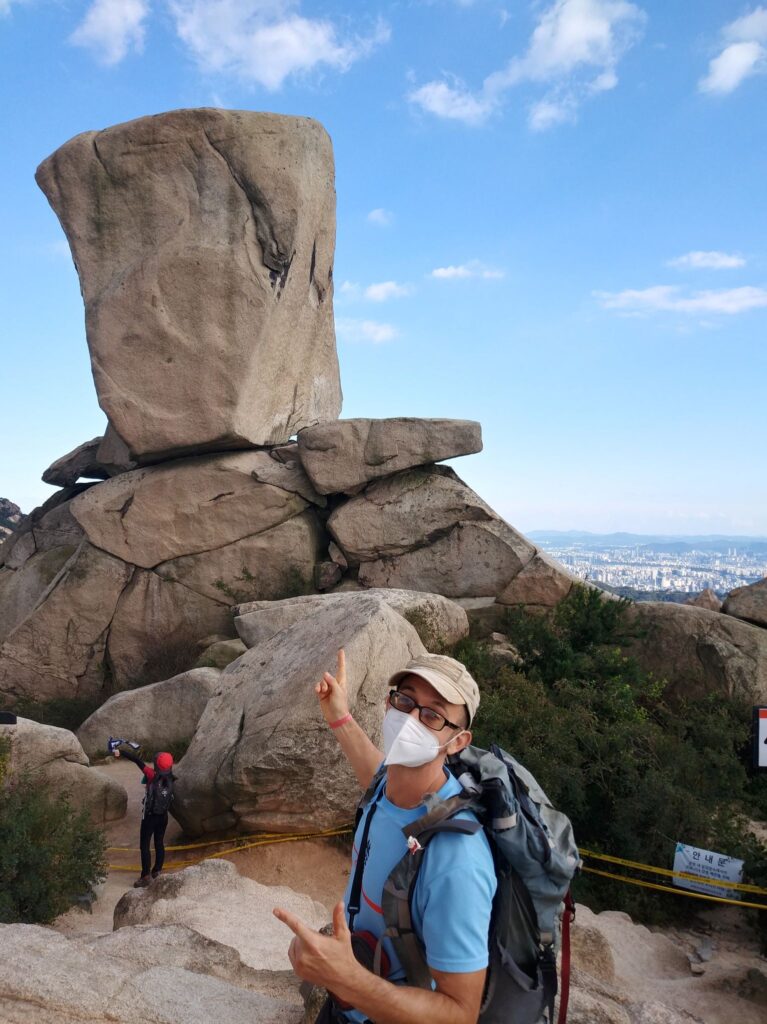
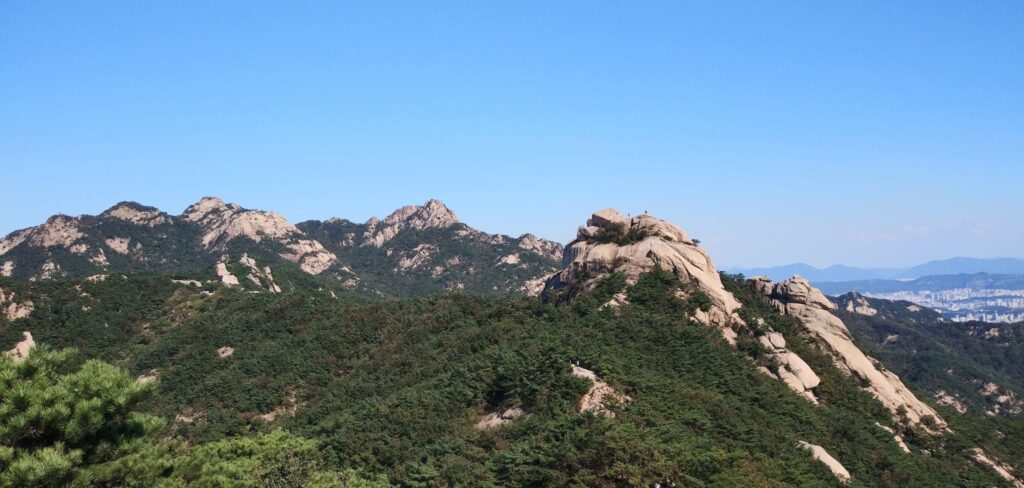
Hongik Ingan- True Korean Beauty
Hongik Ingan- True Korean Beauty
Date- June 1, 2020

Written by George Balarezo, Intrepid Global Citizen
It was another steamy day in Seoul as sweat trickled down my stomach and left my clothes dark with moisture. Rancid as sewage, ribbons of death waltzed their way through my second-story window screen. Burning toxins emitted a noxious mist in the afternoon air. As I sat in my studio apartment, chomping on my vegetable soup and brown rice, I nearly gagged from the shock to my nostrils. The contrasts between mushroom and bean sprout broth, oozing life and energy with each inhale, and the vile odor left my eyes watering and my fists clenched with rage.
As I slipped on my sandals and stomped down the staircase, I braced myself for confrontation. I couldn’t take it anymore. I thought of the right words to say, analyzed the proper honorific particles and verb conjugations to use in a situation where I would need to come off assertive yet polite, candor yet indirect.
In a land thousands of kilometers from North America, age is everything. My five-day-old beard added at least eight years to my chronological age. If I appeared older, then my words would carry much more weight. If the culprit was a man 50 or above, I risked getting chewed out for being a disrespectful and arrogant youth who shouldn’t question his elders. If I didn’t go down there, my inner conflicts would eat away at me and hurt much more than a slug in the face. There was no way I would back down.
There he was, puffing away with his back turned towards me. Short black hair, white cut-off T-shirt and rail-thin arms and legs. I have never stepped in a boxing ring, tumbled on a jujitsu mat, or thrown fists in the street. I knew size meant nothing, especially after getting thrown around by Mongolians half my size in playful wrestling matches on the steppe where Genghis Khan used to roam. This guy could have been on the Korean national boxing team as a featherweight for all I knew.
My heart thumped and my mid-section tightened as the stench infiltrated my flaring nostrils. I faced him, a guy who appeared to be in his mid-thirties and started with my request.
“Excuse me, sir. See that window up there? That’s my apartment. All of your cigarette smoke is floating up to the window and I am coughing up a storm. I am very sensitive to smoke, so do you mind walking about 100 meters in that direction and smoking? I would really appreciate it if you do me that favor.”
His eyes widened in a surprised expression of intrigue tinged with frustration. He didn’t appear to be offended, but one can never know what another person is thinking. He finished his puff of the cigarette while resting his opposite fist against his waist.
“Oh. I don’t mean to disturb you. I am so sorry about that. I will go over there and smoke instead,” the man muttered while giving a slight forward bow in a signal of apology.
I was pleasantly shocked at the man’s reaction. I expected something like “I live in the same building and have the right to smoke wherever I want” or “That’s your problem.”
The man stomped off, and I returned to my apartment to enjoy my meal while inhaling smoke-free air.
Several weeks later, I saw the same man in the staircase and he greeted me with a smile of concern.
“I have been smoking over there in that direction. Is it disturbing you?” he asked while pointing in the same direction I requested him to go several weeks before.
“Oh no. I haven’t been able to smell your smoke. Thank you so much for going over there,” I answered, shocked at his concern for my well-being and even remembering my several week old request.
How would this conversation have gone down in North America or other parts of the world? It depends on which two people had interacted, their moods, personal histories, and psychological states. But over the years in South Korea, I have noticed a pattern. People genuinely go out of their way not to disturb others in public. Disrupting the welfare of other people is one of the most shameful things you can do. Over the course of over ten years, I have had many similar confrontations with smokers in green spaces, people that litter in the street, and senselessly blast their air conditioning inside buildings with the doors wide open, and I have also made my fair share of cultural blunders. Not once have I ever been the recipient of a negative attitude or act of aggression. I am always met with looks of concern or embarrassment and nearly everyone has complied with my request to smoke outside of the park, pick up the trash they threw in the street, or at least close the doors when they use air conditioning. I commend the people here on the Korean peninsula for their sensitivity and consideration for the welfare of others.
After pondering the national psyche and speaking to Korean friends about the issue, I realize that this commitment to the devotion to human welfare can be summarized by the original founding philosophy of the Korean peninsula, Hongik Ingan (홍익인간, 弘益人間), which translates to “work for the benefit of humanity.” People consider the welfare of their neighbors before themselves. If we all live in the spirit of hongik ingan, we can resolve any conflict peacefully and communication will naturally flow. If we don’t communicate, then difficulties will naturally arise. The term Hongik Ingan also contains deep spiritual meaning as one who transcends the self and reaches a higher level of consciousness. This may sound difficult to achieve and quite complicated on the surface, but one can do their part in their daily lives by yielding to the needs of others instead of the self, while aiming to eradicate greed and selfishness.
Thanks to my time on the Korean peninsula, as I am sandwiched in between two contrasting cultures, one of hyper-individualism and the other on becoming a better hongik ingan. It is not all about resolving conflicts peacefully without much worry for the consequences, but rather an ideal way to live for all humans across the world in order to make our world a better place to live.
In this time of pandemic, my vision is magnified and I see nothing but hongik ingans all around me in South Korea. It is rare to see anyone without a mask in public, and those who remove their masks inside supermarkets or trains are called out by others for their lack of consideration. Businesses are all open but have a strict policy- no shirt, no shoes, no mask, no service. When enforcing mask-wearing rules, every interaction is always the same. No arguments. No preaching about freedom. Simply an apology and acknowledgment of wrongdoing and compliance with the behavior that is better for their fellow citizens. No one is perfect in a land of people striving to be better hongik ingans, but people here are always concerned about disrupting others’ right to peace, safety, and health.
I am proud to be living in South Korea. In times of crisis, people reveal their true character and South Korea’s national psyche is shining brightly for the world to learn from.
In a time where our actions could have deadly consequences on others around us, cultivating the hongik ingan spirit has never been as crucial as it is right now. If it means staying home, not going to bars and restaurants, so be it. It is time to become a hongik ingan and strive to eradicate the pandemic and achieve a higher level of realization while tackling humanity’s largest crises as one hongik ingan unit.
A True Adventurer Dies Outside
A True Adventurer Dies Outside
Date- May 29, 2020

Written by George Balarezo, Intrepid Global Citizen
Undulating serpents slithered behind glass cages, opening their frightening mouths trying to bite my finger pressed against the glass, crawling up with an ignorant determination that made me chuckle under my breath. Poisonous snakes, spiders, and other mysterious reptiles all made their home under the same roof in downtown Nairobi in its snake park.
Apart from all the slithery creatures looking for a way out and a new victim to shoot their venom at, the most fascinating part was my encounter with James, a clear-skinned kid in his early twenties with an enthusiasm for his country and its wildlife. His laugh thundered through Nairobi’s snake park hallways when I told him I would be pedaling up to Lake Turkana, more than 2,000 kilometers north. His voice morphed into a high pitched squeal and he slapped himself on the knee hard enough to leave a red indentation upon listening to my plan. James’ upbeat demeanor and pure innocence led me to believe he either spent a lot of time outdoors and was from a rural village. He had that energy to him that only people who spend most of their time outdoors can transmit to others. That carefree spirit of curiosity, enthusiasm, and vigor for adventure. Lean, softball-sized shoulders outlined the sleeves of his blue T-shirt and his thick, veiny neck looked solid as a brick. He reminded me of myself as a college student. Aggressively enthusiastic and ready to slam dunk the world while tearing down the backboard of doubters that stood in my way.
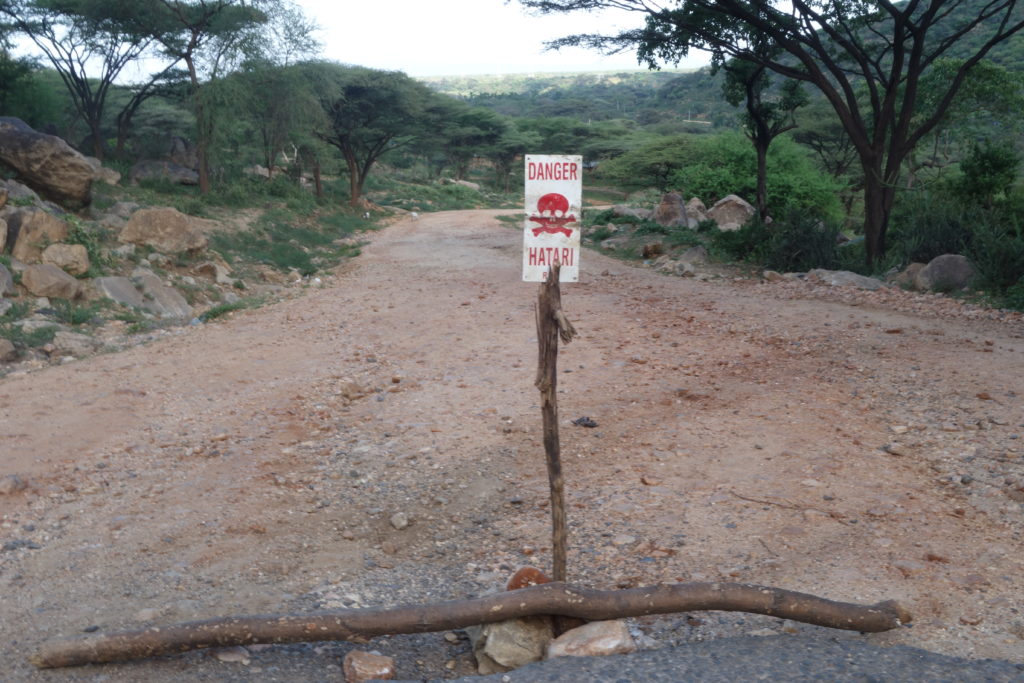
After some small talk about our backgrounds and future plans, l learned that my hunch was correct. My new friend grew up in a rural village in the western part of Kenya and came to Nairobi to study and make some money at the snake center.
“Tell me James. What kind of animals do you have in your village?”
“Oh. All kinds. So many animals. We have leopards, hippopotamuses, lions, crocodiles, buffaloes.”
“Yeah? Please enlighten me James. I am a guy who comes here from the other side of the world who only has deer, squirrels and an occasional coyote to worry about. What do you recommend I do when I ride through a rural area and run into a leopard?”
“Oh leopards are good to have around. Don’t be scared of leopards. If you don’t bother them, they won’t bother you. Here is the thing, when you are walking along the road and you see a leopard, most of the time they just go back into the bush. Sometimes they return near you after another fifty meters. They do this repeatedly every fifty to one hundred meters, going back into the bush and reappearing again. After about five hundred meters, the leopard starts to think of you as its friend. It will protect you. One of my friends was walking with a leopard for several kilometers and some people tried to mug him. The leopard popped out of the bush and mauled the robber. So you see, leopards can be your good friend.”
“Wow. Incredible! I hope I can make friends with a leopard while I am here in Kenya. Okay, so I am sure you don’t go swimming in the lakes and ponds right? Those crocodiles and hippopotamuses must keep swimmers away.”
“Oh my friend! Haha! Of course I go swimming. Swimming is the best way to cool off on a hot day.”
“You aren’t scared of the hippos and crocs? You could die while swimming James.”
“No! No! Not at all! A true man dies outside. It is much better to die at the hands of an animal than in your bed when you are old and tired. I don’t think about danger when I swim.”
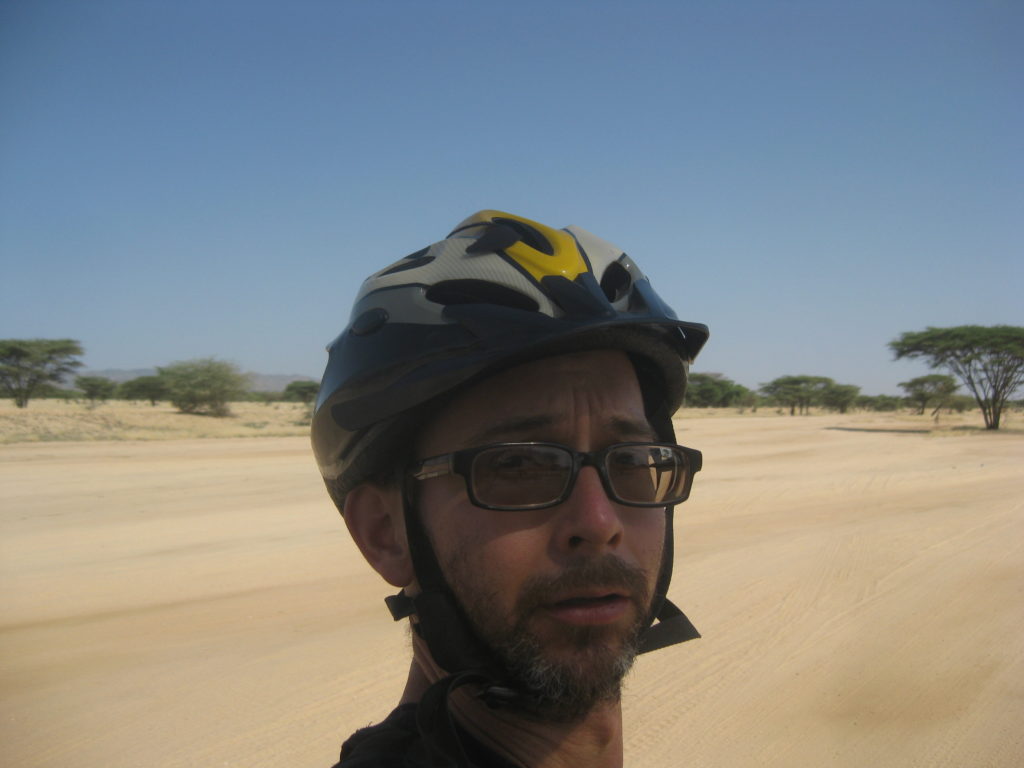
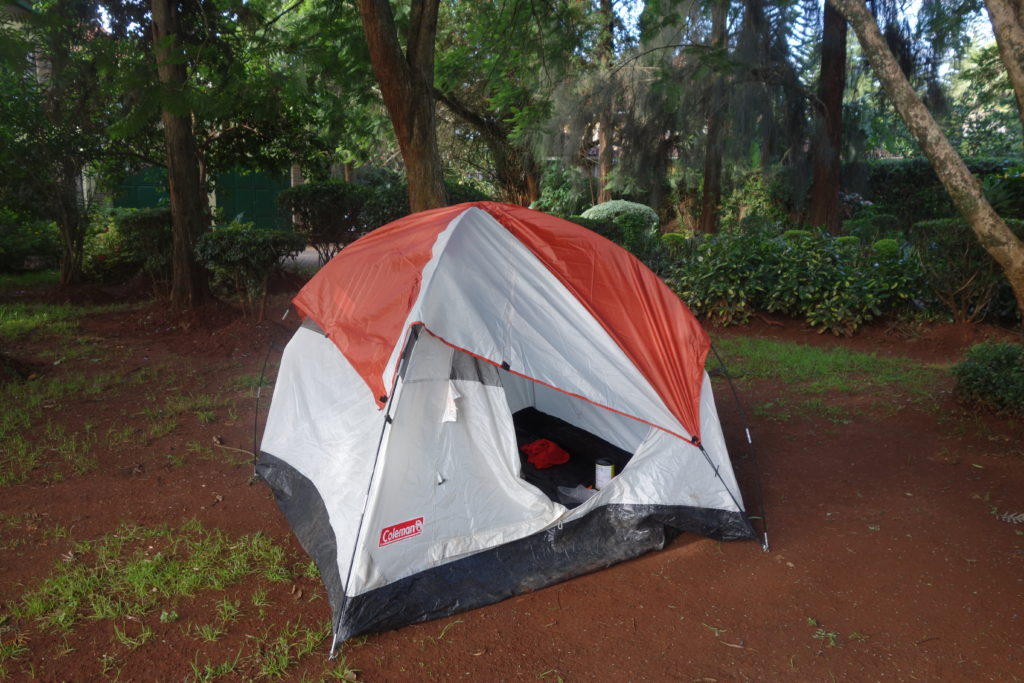
This might be the quote of the year for me. I wanted to tattoo those words on my skin and have James sign his name as blood drips from my shoulder. Nothing in life can be achieved without risk. No wonder this guy seemed so alive. When confronted with your own death every day, how can you not master the art of living? You learn to appreciate the cool, silky waters if every swim could become your last. The fearful among us drown. The confident and steady slowly push themselves back to shore. They keep their cool and figure out which way the current flows, pace themselves as they replenish their lungs with oxygen amid torrential downpours. You learn to laugh and take life less seriously when confronted with your own mortality. It could all be over, at the hands of a famished wild animal, or at the unexpected stoppage of a heartbeat while walking down the street.
As James talked about death, his grin and positive demeanor never left his face. One day when he meets that fateful moment, it seemed as if he would still have that ear to ear smile on his face, proud of the fact that he lived out his destiny. My friend is in his early twenties, the age when we all think we are bulletproof, yet was ready to die while enjoying the simple pleasures of life and living for what he believes in. To have that much clarity at such a young age is rare. To stare at the waters of death and leap in knowing it might all end, what a liberating feeling it must be.
I could relate to James. Those who have never jumped on a bicycle in a faraway land seem to never stop lecturing me about how lucky I am to walk away from my adventures unscathed. The world of tour cycling is alien to most and no matter how colorful a picture I attempt to paint with my words, only those who have tasted it can understand its true flavor. The flavor that changes from sweet to spicy in a matter of hours, right when you think you have a box of cookies, it throws fiery hot jalapenos at you. You grab jalapenos to add some flavor to your bowl of brown rice, grab your spoon and chew, and then those mushy first few bites become rock hard, creating permanent gaps in your teeth. Before you know it, you have a palm-full of chipped molars. All flavors, no matter how pungent, vile, fruity, or tart, do not kill you. For a while, you don’t expect the flavors to change so abruptly, but after a few bites, you learn to enjoy the unexpected. You learn to be comfortable being uncomfortable. You learn to feel safe amid danger. You learn to find compassion amid hostility, to find beauty when the earth flings filth in your direction and spits in your face. It all becomes routine. The average person who has never tasted it will never understand. It is foolish to expect them to.
But the beauty is that when you live dangerously, you live today to its fullest extent. You squeeze the juice of every moment dry, knowing that this moment could be your last. You love and your love is sincere and pure. You live and your life is a fire. A single minute of intense love and living is more profound than an eternity of dead ideals and bondage.
But what is security? Is there anything secure in life? Does security exist, or is it an idea people have created for themselves?
James’ world is all about walking alongside leopards and wading through liquid where crocodiles and hippos rest and feed. My world is one where I am on a bike in faraway places that the news media likes to paint blood red. Sensationalism may sell newspapers, but true men toss the paper aside and go outside and play with death every day. Mediocre men read newspapers and hesitate. Superior men do the unreasonable thing and attempt to change the status quo. As George Bernard Shaw once said, “The reasonable man adapts himself to the world, the unreasonable man adapts the world to himself, therefore all progress depends on the unreasonable man.” Go outside and play, even if there are leopards, crocodiles, and hippos out there.
It was only my first full day in Kenya, but James had my heart jumping in anticipation. James swims with crocs and hippos. I was about to cycle with lions and leopards. Play on and remember a true adventurer dies outside.
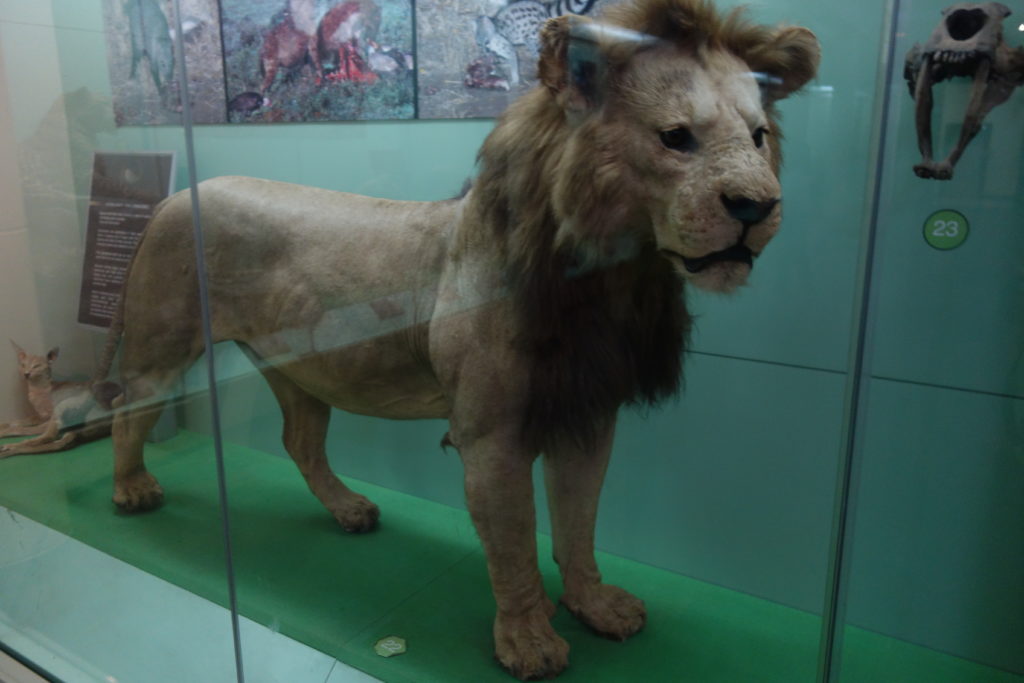
Paddling Through a Pandemic of Possibility in South Korea
Paddling through a pandemic of possibility in South Korea
Date- May 11, 2020

Written by George Balarezo, Intrepid Global Citizen
Beep! Beep! My stopwatch alarm clock sings its high pitched song as I pull a pair of sweats over my wiry, hairy legs and zip up my jacket. I wake up refreshed from a night’s sleep, as my body and mind warp themselves back to conscience reality. Mask strapped to my face, I push the cold metal doors of my Donjack Gu apartment open and am greeted by honking motorbikes, buses plopping over speedbumps, and the voice of a megaphone announcing garlic and onion prices to early morning shoppers. I trot up a hill past the morning hubbub ten minutes from my apartment door and arrive at the top of a small hill overlooking Seoul’s apartments, green hills, and pink skies. Today the outline of Samgaksan, the three-tiered mountain that makes up Seoul’s most trotted national park, lingers in the distance under musky white clouds that blot the burning sky. Cotton candy for the eyes amidst an onslaught of fiery pink and purple. The cool spring air is filled with floral scents of lavender. The aroma of freshly cut grass massages my nasal cavities with its foresty delight. White penny-sized cherry blossoms tinged with pink edges sway back and forth in the crystal breeze. A wrinkled woman half my size wrestles her way into a bush of purple flowers while her husband snaps a few shots. The woman’s smile radiates through her masked face, pushing her eyes into squinty sockets of delight.
In the midst of the COVID-19 pandemic, I have never felt better. I heave oxygen in the local park as I sprint up wooden staircases blanketed by pine trees and white flowers dangling from toothpick thin branches. I feel my lungs healing with every panting yell of pain it takes to suck in more air. The harder I breathe today, the more efficiently my lungs will repair themselves. This is my belief, even if nothing more than a placebo. I run extra laps today with ease and delight. I am so lucky to have this opportunity. An opportunity to suck in as much air as my lungs desire and brain decides. I know this won’t last forever. The only thing constant about history is change.
Once it’s all over, I cross my legs and I sit in a sun-soaked field of dry yellow grass with my eyes shut and observe the sensations of hunger, thirst, pulsating legs, and drops of sweat trickling down my forehead. Images of yellow and orange cloud my vision as the sun emerges from behind the skyscrapers. My mind is at ease and my breath slows to the optimal cadence to fill my brain with euphoria and clarity. My thoughts wander to the juicy oranges in my fridge, the video on persuasive speaking I have to upload for my students, and the book I want to finish reading. Then finally, my thoughts return to the task at hand, wishing all sentient beings peace, love, health, and positive energy.
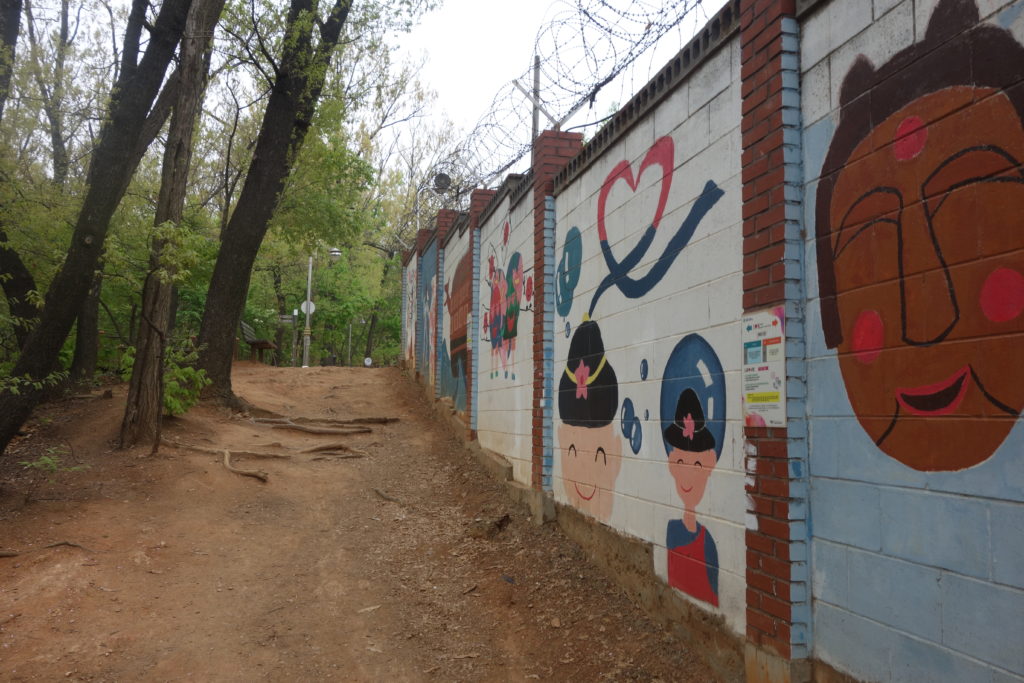
Rewind to last spring, only 12 months ago. My eyes are bloodshot and I am wheezing for air. I cough as brain fog infests me with thoughts of aggression and rage. Why is that man staring at me? What made that taxi driver honk at a guy like me on a bike? How dare that old man smoke at the bus stop! I sprint home to escape its wrath. I lock the door, barricade my windows, and shut the blinds. It crashes through the barriers of my second-story apartment. The unwelcomed visitor pushes its way in. It surrounds me from all angles. I breathe. I lose. It stalks me, robs me from my freedom. My human rights are violated. Water, food, shelter- check. Inhale. Exhale. Cough. Cough. Yellow gobs of phlegm in my toilet bowl. I go outside. It’s there. I teach a class. It lingers all around me. I buy food at the market. It leaves dusty layers of filth on my spinach and broccoli. Its presence suffocates me.
Spring in South Korea, it used to be all honey-scented cherry blossoms every day ten years ago when I first arrived. Neighborhood mountains gifted visitors with spectacular views at any time of day. Scents of nature provided relief from stress-filled offices and study rooms. One could spend entire weekends outdoors, sleeping in tents at park entrances and mountain tops.
It all gradually changed. Factories, coal plants, Gobi desert wind storms, and economic activity all resulted in the downfall. Ten years ago yellow dust only visited the peninsula for one week per year during the spring, now yellow dust and fine particle reports are part of daily news reports, are displayed on Naver’s homepage (South Korea’s version of Google), and LED screens on highways.
I don’t need all the information, I have an internal air quality monitor that tells me how clean or filthy my lungs are and how cloudy my brain is. Wake up refreshed, clean air. Wake up fatigued, dirty air. Every day is different. Every day I wake up energized, I send more positive energy out to the world during my morning meditation session. Every day I wake up fatigued, I am a flustered mess, my mind sent into a tailspin of internal chaos. I cut my meditation sessions short as I sit and whither in a fiery storm of helplessness, anger, and sadness. The negative emotions are too much to take and I open my stinging eyes.
The government advises against exercise on bad days, but I do it anyway. At least my hormones will get straightened out, while my lungs take a punishment. It is a tradeoff I am willing to take. As I inhale fumes of dusty particles at the local park, I fume up an internal storm. I fume at the politicians who brought this to me. I fume at everyone who blames China in my neighborhood and shrugs their shoulders in helpless denial. I fume at myself for not doing more to prevent this catastrophe. Forget others. Forget others blaming others. It’s all my fault.
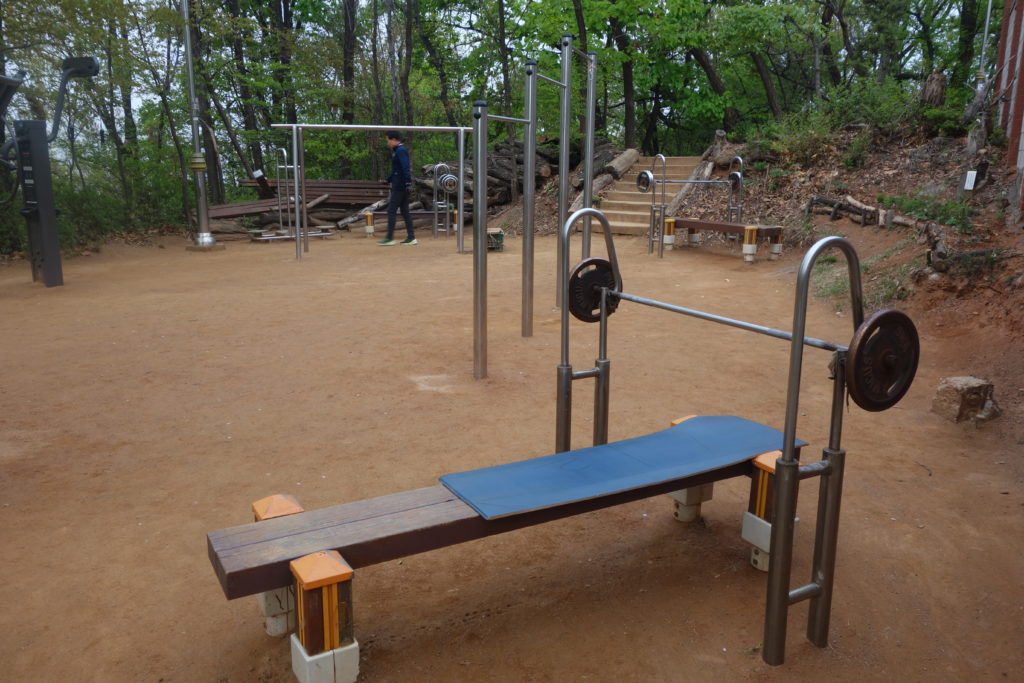
Spring is my season, I am Chunsam, meaning three times spring in Korean. I fell in love with my alter ego over ten years ago. Lately, that guy with the old fashioned name blows his smoke in my face and slaps me in my sleep until my eyes morph to sickly bloodshot balls of pain. My alter ego now wraps its hands around my neck and squeezes the years from my life with all its might. Where did our relationship go wrong? I desperately want to make things right again, but don’t even know where to start. We were supposed to be best friends forever, but now spring pollutes me and tears my heart in half.
Now that economic activities have halted all around the world, our flame bursts with renewed zeal. Mornings waking up with sore throats, red eyes, and brain fog have transformed into mornings waking up with a renewed zest to tackle the day and gratitude for the clean air I inhale.
The statistics tell a similar tale, according to the WHO 4.2 million people are killed each year by air pollution. The worldwide lockdown has resulted in a decrease in combustion of damaging petrol and diesel in cars and oil, coal, and gas in power plants. History tells us that the only time carbon dioxide emissions decrease is during periods of economic crises. Many public health experts claim that the reduction in air pollution-related deaths may offset the number of pandemic fatalities. In short, the coronavirus may actually be saving lives.
There is a price to pay for showing our devotion to the religion of modernity, whose foundational commandment is that economic growth is absolutely essential. Random acts of kindness, meditation, and taking a walk through a forested path on a sunny day are all free and run contrary to the dogmatic law that tells us we can solve all our problems by accumulating and producing more stuff. The system will never tell us “that is enough growth, you can take a break now.” You can’t monetize fresh air. You can’t put a price tag on pain- free eyes, healthy lungs, or mental clarity. As we have seen with the current pandemic, an ecological catastrophe could lead to an even more monumental economic ruin, political quarreling, and could render humans extinct.
If the ghosts of ancient hunter-gatherer societies could see us now, they would be scratching their heads in confusion. Look at how easy things are. People in the economically developed world don’t need to walk for an hour to the river to collect water, wash themselves and their clothes, or scavenge the land for food. Instead, we have dishwashers, supermarkets, water and light at the flip of a switch, yet are suffering from more depression, anxiety, and suicide than ever before.
Anthropologists studied the Hadza of Tanzania, one of the world’s last remaining foraging tribes who search the land for fruit, honey, and bush meat. They are on their feet for most of the day and are known to camp out close to water sources while staying up late into the night, awaiting the arrival of an animal to aim their poisonous arrow at and feast on. This tribe spends at least four to six hours per day moving across the savanna while dodging snakes that could render them blind with one shot of venom, lions who could tear them to shreds, and angry buffaloes who maul invaders of their territory. The most fascinating thing about this group of hunter-gatherers is not their ancient lifestyle, but the fact that anthropologists have been studying them since the 1960s and not one case of depression or suicide has ever been reported. Perhaps we should look to the Hadza for more wisdom on the good life.
The Hadza’s tale reminds me that we are now swimming in a pool of possibilities. A possibility to take a step back and return to the essence of human existence. The possibility to return back to purity, freedom, and clarity. Take in the deep gulps of fresh air that were so rare before this all started. Free yourself from hyper-consumerism and modernism, the invisible contracts we were forced to sign at the subliminal level for being born during this time in history. Emerge not as a victim, but empowered with greater clarity. Actualize a more fulfilling life experience. Take time to pause and be grateful for the people you have in your life, no matter how imperfect they may be. Be liberated by human connection and fresh air all around you. Be intoxicated by the potential for global cooperation and world peace having common problems to tackle can create. Go inward and overcome the fear of the inability to control what is happening around you. Remember that control is always an illusion and all we have is this moment and the choices it presents. Invest your time in the things you can control- eat better food, get better sleep, move your body more. Break the behaviors and reactions that don’t serve you.
Life can beat on us with its brass knuckles. People become ill and pass on, jobs and fortunes lost overnight. Remember there are heroes walking among us on every corner treating the ill and providing food and necessities for the masses. Don’t let this pass without reflection. Be the hero to yourself or your neighbor. Be the possibility and bring back the purity.
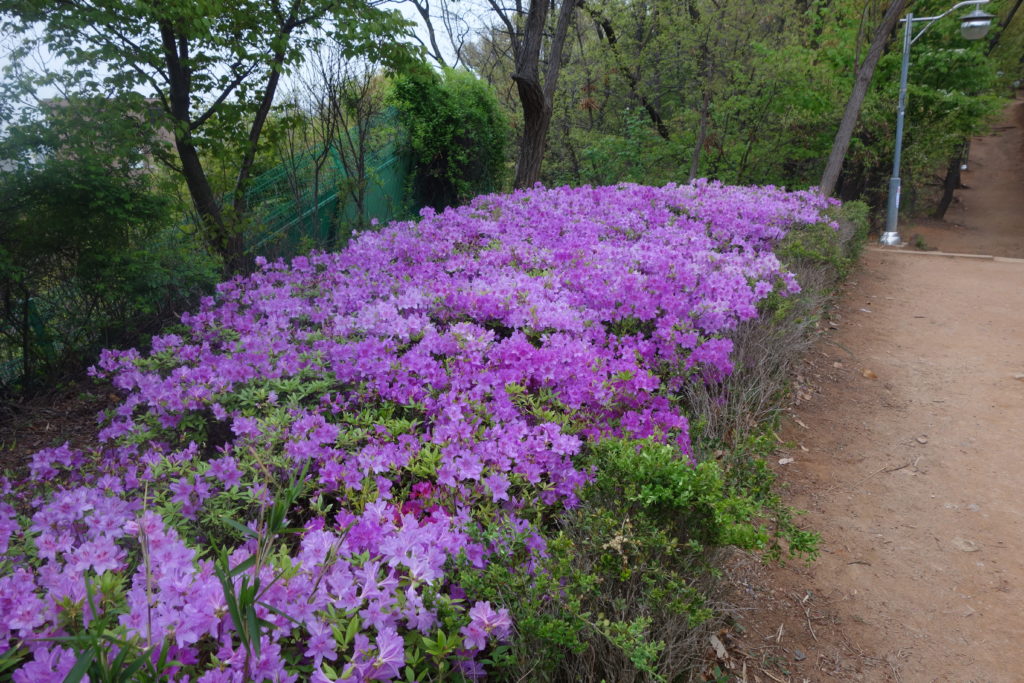
Reflections on Boredom in Mongolia
Reflections On Boredom in Mongolia
Date- April 17, 2019

Written by George Balarezo, Intrepid Global Citizen
A long queue awaited us at the border and we were ready to jump right into the mess. Lines of cars were waiting for hours as bored passengers were having picnics on the side of the road. Locals were standing around shooting the breeze with one another, anything but stressed out.
Many inhabitants of the economically developed world thinks their time is so valuable, however all you need to do is be present and focused on something and one can be entertained for hours. People in Mongolia know how to make the best of situations that those in my home country would consider a “big waste of time.”
Boredom is the greatest educator in the world. It has always forced me to create my own entertainment. Striking up conversations with those around me while having nothing to do or nowhere to go has lead me to life changing conversations. I am so glad I did not grow up with a computer in my hand to distract me from the things that are important in my life. Computers and electronic devices distract me from my boredom. Looking closer at my surroundings has often lead me to life realizations. I can’t learn anything new consuming the same media, watching the same TV station or same Youtube channel. Boredom breeds creativity and new ideas. Simply by sitting and doing nothing, I have had some of the most creative ideas in my life. My mind relaxes when I am bored. When I was doing nothing, I decided to create a new class to teach at my university and ideas kept popping into my head. When I was sitting in silence, book ideas kept creeping into my imagination and now several are becoming reality. When I was bored and doing nothing, my ideas for this post came to light in a simple manner. Ideas pop into my head and become words and actions and boredom is my empty canvas.
Science suggests that creative ideas result when alpha waves while relaxes with their eyes closed, when we are daydreaming or doing aerobic exercise. New ideas do not magically pop into our heads when our boredom stresses us out. Allow boredom to become part of your daily routine to unleash the artist within you. Learn from the Mongolians the art of enjoying your boredom. Wouldn’t life be so much sweeter if all of humanity learned the skill of patience and waiting?

Bicycle Touring In Mongolia- A Battle With The Elements
Tour Cycling in Mongolia- A Battle With the elements

Written by George Balarezo, Intrepid Global Citizen
Mongolian weather is notorious for wreaking havoc on anyone that attempts to challenge it to a duel. Summer snow storms so cold that toes and fingers turn numb for months. Blinding winds that toss sand and dust into any passerby’s eye sockets, leaving the poor souls that attempt to tough it out running to the nearest yurt for shelter. Heavy rains that transform the land of Genghis Khan ‘s dirt roads into impassable mud pits. Mongolian weather is full of extremes; and changes faster than the time it takes Lebron James to run the length of a basketball court.
Along the corridor to Ulgi, the country’s Western oasis town, the infamous Mongolian weather decided to put me to the test. Nature versus human. Who would come out on top? This human was determined to show Mother Nature he would not bow down so easily. My opponent knocked me to the ground, left me drained of my energy and nearly beat me into submission on my previous cycling journeys. How much mercy would the Mother of the natural world have on me this time? I must take on fierce opponents in order to be reborn as a warrior-like version of myself. Come on Mongolia. Give it to me!

The uphill climb started off slowly. The mountain pass was straight ahead in the distance and did not look as challenging as others I encountered along the Pamir or Karakorum Highways. Mother Nature must have read my mind, because she suddenly began to taunt and have her way with me.
The previous night I stayed with a local man in his yurt and the evening wind gusts left me rattled. Vroom! His makeshift tent rumbled and vibrated back and forth. “Was that an earthquake?” I asked.
“No it’s the wind,” he answered, appearing to not even be the least bit worried.
“If a local Mongolian guy does not freak out, then I don’t need to either. I hope the same wind does not come back when I am out there tomorrow on my bike,” I thought.
The wind gusts were other worldly. Dark grey clouds hovered above me, blocking the sun I enjoyed for the previous few hours, signaling a drastic change in weather. This was totally unexpected as I left in the morning thinking the day would be filled with sunshine and mild weather. The wind pounded right into my face, heaving sand and dust into my face. I was moving slower in my lowest gear now. Despite pedaling with all of my might, I was moving at a leisurely walking speed. I would have been better off tossing my bike into the sand embankment and hiking up the slope. “Should I leave my bike behind?” I thought. That was not a viable option. I purchased this piece of metal machinery exclusively for this leg of the trip. Any other bike would not have survived up until this point.
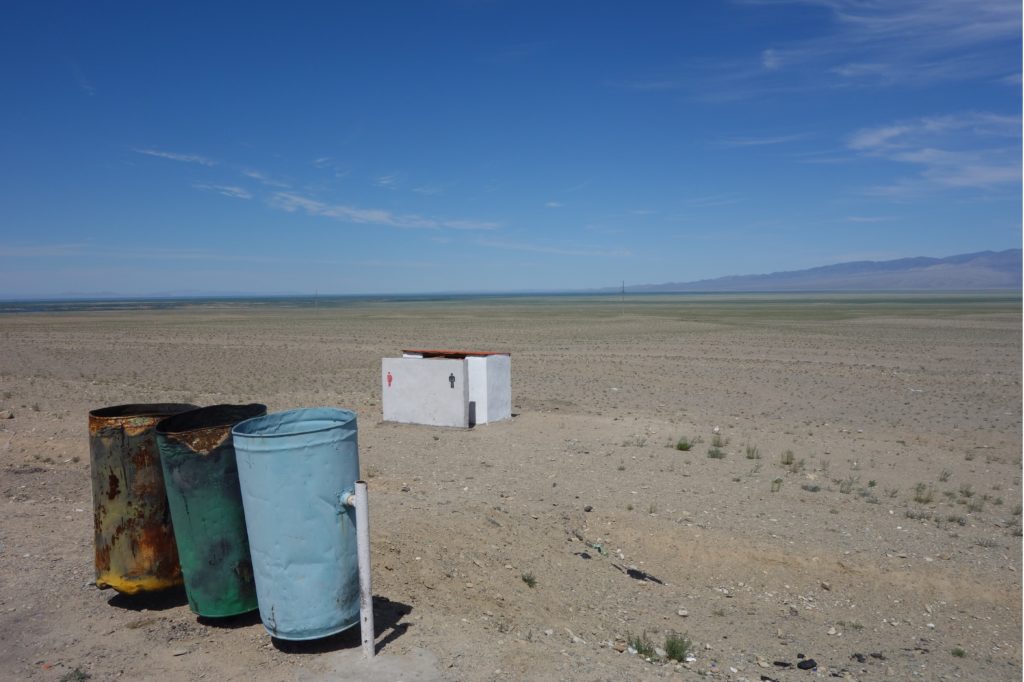
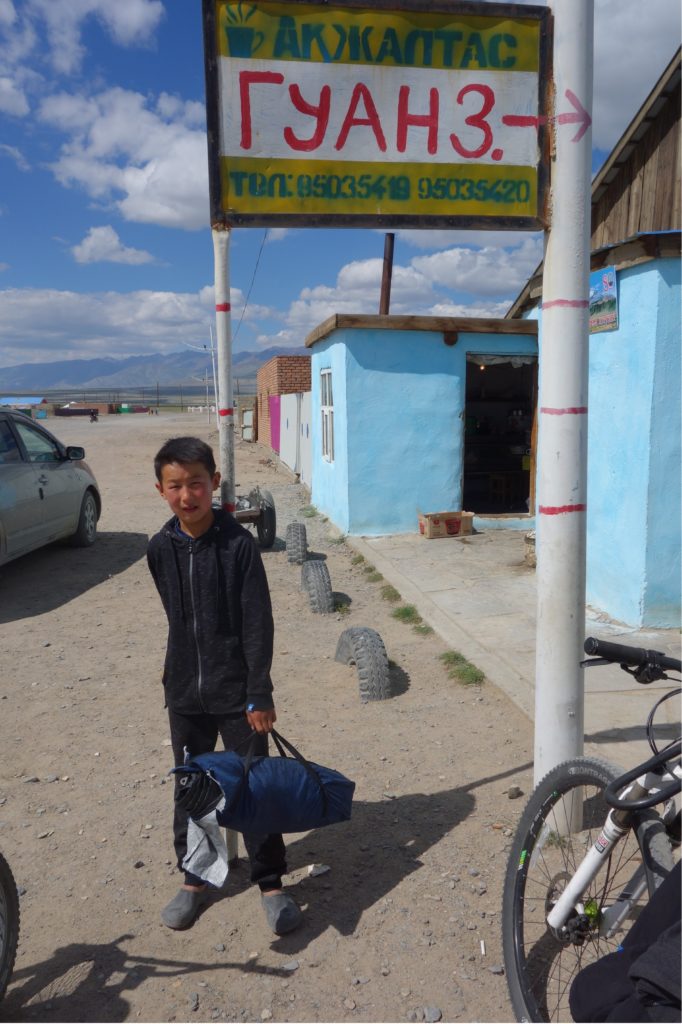
Keep pedaling. One turn of the wheel after another. One hour went by and the top of the mountain pass still looked exactly as far away as it did sixty minutes before. The wind was deafening. As air struck my helmet, it let off a whistling noise that even an army drill sergeant would deem impossible to duplicate. The sound of whistling in my ear left my head aching for peace and quiet.
Whoosh! The noise caught me off guard that I almost flew over my handlebars. An eighteen-wheel semi truck whizzed past, coming only an arm’s length away from knocking me into another world. The wind was so loud I did not even hear it creeping up from behind. My sense of hearing was deemed useless at this point and I continued to glance behind me every five minutes to make sure I did not get picked off by another vehicle.
This was completely insane. I was on my way to Ulgi, a major town in Western Mongolia. One of my tire spokes snapped already on account of roads so torn up that they leave cyclists feeling like they are undergoing epileptic seizures. I had visions of my rear tire bending itself out of proportion on account of supporting my panniers and an 80 kilogram rider, rendering my bike useless. All I had to do was make it another forty kilometers into town. Come on!
The wind shifted at will. Every change in direction nearly knocked me off my bike onto the rocky terrain. I had to use every once of concentration and all of my metal strength just to stay up on my bike. It was like I was undergoing a Mongolian right of passage test. Would I pass this one? When would the celebration ceremony start?
That’s it. I am getting off. I pushed my bike up the remainder of the hill for another thirty minutes that seemed like four hours. Each step weakening me and leaving me more mentally drained than final exam week in engineering school.
I finally made it. I threw my bike to the side and scanned the grassy mountains all around me. Admiring the distance I covered in such wretched conditions was my short victory celebration. The wind continued to beat me into oblivion. It must have been gusting at at least 60 kilometers per hour.
Lets go. I glided down the mountain and the wind dissipated. Now I was flying at full speed down the hill, the butterflies in my stomach fluttering like a teenager on his first date. Let the right of passage celebration begin. I became a Mongolian man that day and was ready to take on whatever this mysterious land had in store for me.
